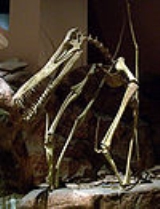
List of pterosaurs
Encyclopedia
This list of pterosaurs is a comprehensive listing of all genera
that have ever been included in the order Pterosaur
ia, excluding purely vernacular terms. The list includes all commonly accepted genera, but also genera that are now considered invalid, doubtful (nomen dubium
), or were not formally published (nomen nudum
), as well as junior synonyms of more established names, and genera that are no longer considered pterosaurian. The list currently includes 178 genera.
's Dinosaurs: The Encyclopedia series.
. Technical terms used include:
of geologic time to which the fossils date. The abbreviations are as follows.
Genera that are invalid, misidentified, or otherwise do not represent a valid pterosaur are listed as age N/A because there was never a time in which a pterosaur by that generic name actually lived.
er="0" style= height:"100%" align="right" style="background:transparent;">
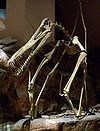



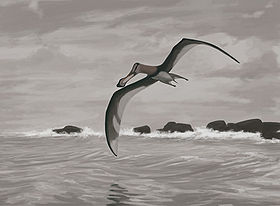


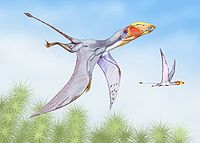

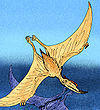
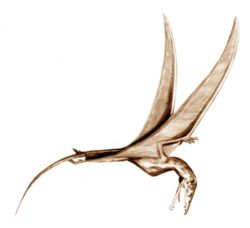

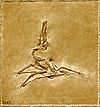


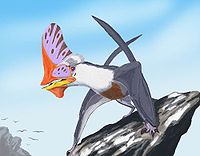

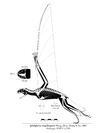
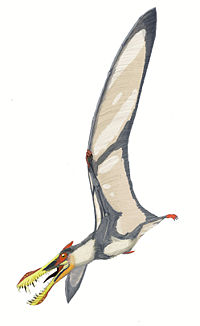

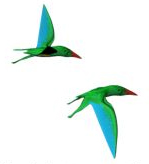
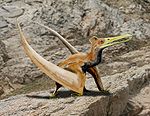

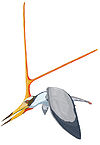
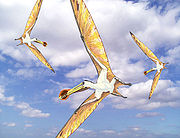
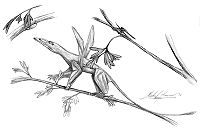
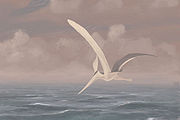
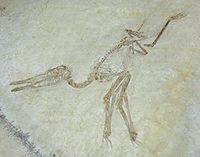
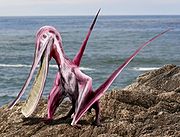
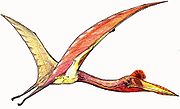
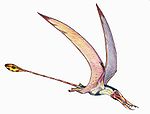
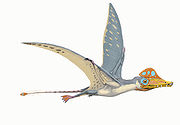
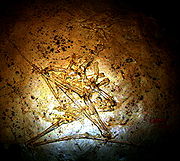

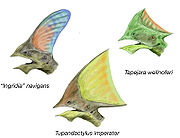
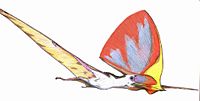
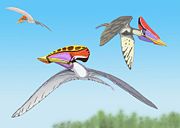
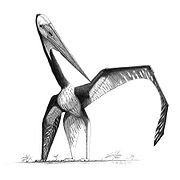
er="0" style= height:"100%" align="right" style="background:transparent;">
 >
>
Genus
In biology, a genus is a low-level taxonomic rank used in the biological classification of living and fossil organisms, which is an example of definition by genus and differentia...
that have ever been included in the order Pterosaur
Pterosaur
Pterosaurs were flying reptiles of the clade or order Pterosauria. They existed from the late Triassic to the end of the Cretaceous Period . Pterosaurs are the earliest vertebrates known to have evolved powered flight...
ia, excluding purely vernacular terms. The list includes all commonly accepted genera, but also genera that are now considered invalid, doubtful (nomen dubium
Nomen dubium
In zoological nomenclature, a nomen dubium is a scientific name that is of unknown or doubtful application...
), or were not formally published (nomen nudum
Nomen nudum
The phrase nomen nudum is a Latin term, meaning "naked name", used in taxonomy...
), as well as junior synonyms of more established names, and genera that are no longer considered pterosaurian. The list currently includes 178 genera.
Scope and terminology
There is no official, canonical list of pterosaur genera, but the most thorough attempts can be found at the Pterosauria section of Mikko Haaramo's Phylogeny Archive, the Genus Index at Mike Hanson's The Pterosauria, supplemented by the Pterosaur Species List, and in the fourth supplement of Donald F. GlutDonald F. Glut
Donald F. Glut is an American writer, motion picture director, screenwriter, amateur paleontologist, musician and actor....
's Dinosaurs: The Encyclopedia series.
Authors and Year
The authors column lists the authors of the formal description responsible for the erection of the genus listed. They are not necessarily the same as the authors of the type species as sometimes a species from one genus is determined sufficiently distinct to warrant the erection of a new genus to house it. If this is the case, only the latter authors will be listed. The year column notes the year the description was published.Status
Naming conventions and terminology follow the International Code of Zoological NomenclatureInternational Code of Zoological Nomenclature
The International Code of Zoological Nomenclature is a widely accepted convention in zoology that rules the formal scientific naming of organisms treated as animals...
. Technical terms used include:
- Junior synonym: A name which describes the same taxon as a previously published name. If two or more genera are formally designated and the type specimens are later assigned to the same genus, the first to be published (in chronological order) is the senior synonym, and all other instances are junior synonyms. Senior synonyms are generally used, except by special decision of the ICZN, but junior synonyms cannot be used again, even if deprecated. Junior synonymy is often subjective, unless the genera described were both based on the same type specimen.
- Nomen nudumNomen nudumThe phrase nomen nudum is a Latin term, meaning "naked name", used in taxonomy...
(Latin for "naked name"): A name that has appeared in print but has not yet been formally published by the standards of the ICZN. Nomina nuda (the plural form) are invalid, and are therefore not italicized as a proper generic name would be. If the name is later formally published, that name is no longer a nomen nudum and will be italicized on this list. Often, the formally published name will differ from any nomina nuda that describe the same specimen. - Preoccupied name: A name that is formally published, but which has already been used for another taxon. This second use is invalid (as are all subsequent uses) and the name must be replaced. As preoccupied names are not valid generic names, they will also go unitalicized on this list.
- Nomen dubiumNomen dubiumIn zoological nomenclature, a nomen dubium is a scientific name that is of unknown or doubtful application...
(Latin for "dubious name"): A name describing a fossil with no unique diagnostic features. As this can be an extremely subjective and controversial designation, this term is not used on this list.
Age
The age column denotes the epochSeries (stratigraphy)
Series are subdivisions of rock layers made based on the age of the rock and corresponding to the dating system unit called an epoch, both being formally defined international conventions of the geological timescale. A series is therefore a sequence of rock depositions defining a...
of geologic time to which the fossils date. The abbreviations are as follows.
- uT is Upper Triassic
- lJ is Lower Jurassic
- mJ is Middle JurassicMiddle JurassicThe Middle Jurassic is the second epoch of the Jurassic Period. It lasted from 176-161 million years ago. In European lithostratigraphy, rocks of this Middle Jurassic age are called the Dogger....
- uJ is Upper Jurassic
- lK is Lower Cretaceous
- uK is Upper Cretaceous
Genera that are invalid, misidentified, or otherwise do not represent a valid pterosaur are listed as age N/A because there was never a time in which a pterosaur by that generic name actually lived.
Location and Notes
The location column designates the geographic region where remains of the relevant genus have been found. The regions used are continents except in the case of smaller landmasses (e.g. Cuba). Political bodies, being non-existent in the Mesozoic are not used to indicate genera locations. Genera that are invalid, misidentified, or otherwise do not represent a valid pterosaur are listed as location N/A because there was never a place in which a pterosaur by that generic name actually lived. The notes column is a collection of annotations on the scientific significance and taxonomic history of listed genera, as well as elaborations on the information presented in other columns.Genera
| s="wikitable sortable" style="width: 100%; font-size: 95%;"> | ||||||
| Genus | Authors | Year | Status | Age | Location | Notes |
|---|---|---|---|---|---|---|
Aetodactylus Aetodactylus Aetodactylus is a genus of ornithocheirid pterodactyloid pterosaur. It is known from a lower jaw discovered in Upper Cretaceous rocks of northeastern Texas, United States... |
Myers |
2010 2010 in paleontology -Anomalocaridids:-Newly named crustaceans:-Newly named insects:* A new family, Cascopleciidae, is published by Poinar Jr.* A new family of ceraphronoid Hymenopters, Radiophronidae, is published by Ortega-Blanco, Rasnitsyn, and Delclòs.... |
Valid. | N. America North America North America is a continent wholly within the Northern Hemisphere and almost wholly within the Western Hemisphere. It is also considered a northern subcontinent of the Americas... |
||
Aidachar Aidachar Aidachar is an extinct genus of ichthyodectiform teleost ray-finned fish from the Late Cretaceous of Kyzyl Kum, central Asia. It was named by Lev Nesov in 1981. At first, he tentatively described the fossil material as the jaw fragments of a ctenochasmatid pterosaur , but reinterpreted Aidachar... |
Nesov |
1981 1981 in paleontology -Newly named dinosaurs:Data courtesy of George Olshevsky's dinosaur genera list and Dr. Jeremy Montague's dinosaur genus database.-Plesiosaurs:* Carroll, R. C., 1981, Plesiosaur ancestors from the Upper Permian of Madagascar: Philosophical Transactions of the Royal Society, London B, v. 293,... |
Misidentification. | N/A |
N/A |
Actually a teleost fish whose remains were originally mistaken for jaw fragments of a ctenochasmatid Ctenochasmatidae Ctenochasmatidae is a group of pterosaurs within the suborder Pterodactyloidea.-Classification:Listing of subfamilies and genera after Unwin 2006 unless otherwise noted.* Family Ctenochasmatidae** Elanodactylus** Gegepterus... . The mistake was corrected in 1986 1986 in paleontology -Newly named dinosaurs:Data courtesy of George Olshevsky's dinosaur genera list and Dr. Jeremy Montague's dinosaur genus database.-New taxa:-Pterosaurs:... . |
Alanqa Alanqa Alanqa is a genus of pterosaur from the Late Cretaceous Kem Kem Beds of southeastern Morocco.... |
Ibrahim et al. |
2010 2010 in paleontology -Anomalocaridids:-Newly named crustaceans:-Newly named insects:* A new family, Cascopleciidae, is published by Poinar Jr.* A new family of ceraphronoid Hymenopters, Radiophronidae, is published by Ortega-Blanco, Rasnitsyn, and Delclòs.... |
Valid | Africa Africa Africa is the world's second largest and second most populous continent, after Asia. At about 30.2 million km² including adjacent islands, it covers 6% of the Earth's total surface area and 20.4% of the total land area... |
||
Amblydectes |
Hooley |
1870 1870 in paleontology -Dinosaurs:-New taxa:-New taxa:-Non-mammalian:... |
Jr. synonym. |
N/A |
N/A |
Junior synonym of Coloborhynchus Coloborhynchus Coloborhynchus is a genus in the pterosaur family Ornithocheiridae, and is known from the Lower Cretaceous of England , and possibly the Aptian age of Brazil and Texas, depending on which species are included.-Description:The type specimen of Coloborhynchus is known only from a partial upper jaw... . |
Angustinaripterus Angustinaripterus Angustinaripterus was a basal pterosaur, belonging to the Breviquartossa, and discovered at Dashanpu near Zigong in the Szechuan province of China.Angustinaripterus was named in 1983 by He Xinlu.... |
He Xinlu et al. |
1983 1983 in paleontology -Newly named dinosaurs:Data courtesy of George Olshevsky's dinosaur genera list and Dr. Jeremy Montague's dinosaur genus database.-New taxa:-Non-mammalian:... |
Valid. | Asia Asia Asia is the world's largest and most populous continent, located primarily in the eastern and northern hemispheres. It covers 8.7% of the Earth's total surface area and with approximately 3.879 billion people, it hosts 60% of the world's current human population... |
Known from a single skull recovered from the Dashanpu Formation Dashanpu Formation The Dashanpu Formation is a Mid to Late Jurassic rock formation in China, most notable for the wealth of dinosaurs that have been excavated from the area... . Its Dorygnathus Dorygnathus Dorygnathus was a genus of pterosaur that lived in Europe during the Early Jurassic period, 180 million years ago when shallow seas flooded much of the continent. It had a short 1.5 meter wingspan, and a relatively small triangular sternum, which is where its flight muscles attached. Its skull... -like teeth suggest it had a piscivorous diet. |
|
Anhanguera Anhanguera (pterosaur) Anhanguera is a genus of pterodactyloid pterosaur known from the Lower-Cretaceous Santana Formation of Brazil, with referred specimens found in the Upper Chalk Formation and Cambridge Greensand of the UK... |
Campos Kellner Alexander Kellner Alexander Wilhelm Armin Kellner is a Liechtensteinian/Brazilian paleontologist, a leading expert in the field of the study of pterosaurs.... |
1985 1985 in paleontology -Insects:-Newly named dinosaurs:Data courtesy of George Olshevsky's dinosaur genera list and Dr. Jeremy Montague's dinosaur genus database.-New taxa:-New taxa:-Non-mammalian:-References:... |
Valid. | S. America South America South America is a continent situated in the Western Hemisphere, mostly in the Southern Hemisphere, with a relatively small portion in the Northern Hemisphere. The continent is also considered a subcontinent of the Americas. It is bordered on the west by the Pacific Ocean and on the north and east... |
A piscivorous ornithocheirid from the Santana Formation Santana Formation The Santana Formation is a geologic Lagerstätte in northeastern Brazil's Araripe Basin where the states of Pernambuco, Piauí and Ceará come together. The geological formation, named after the village of Santana do Cariri, lies at the base of the Araripe Plateau... . A study of its anatomy helped resolve controversy regarding pterodacyloids' posture while on the ground. |
|
Anurognathus Anurognathus Anurognathus is a genus of small pterosaur that lived approximately 150 million years ago during the late Jurassic Period .... |
Döderlein |
1923 1923 in paleontology -Newly named dinosaurs:Data courtesy of George Olshevsky's dinosaur genera list and Dr. Jeremy Montague's dinosaur genus database.-New taxa:-Non-mammalian:... |
Valid. | . |
Europe Europe Europe is, by convention, one of the world's seven continents. Comprising the westernmost peninsula of Eurasia, Europe is generally 'divided' from Asia to its east by the watershed divides of the Ural and Caucasus Mountains, the Ural River, the Caspian and Black Seas, and the waterways connecting... . |
A tiny (50 cm wingspan) insectivore known only from two skeletons recovered from the Solnhofen Formation. |
Apatomerus Apatomerus Apatomerus , is a genus of extinct reptile known from a single fossil from the Albian-age Kiowa Shale of Kansas, USA. This bone, collected in 1893, was first identified as the thighbone of a crocodilian, but was described in 1903 by Samuel Wendell Williston as belonging to a pterosaur... |
Williston Samuel Wendell Williston Samuel Wendell Williston was an American educator and paleontologist who was the first to propose that birds developed flight cursorially , rather than arboreally . He was also an entomologist, specialising in Diptera.-Early life:Williston was born in Boston, Massachusetts to Samuel Williston and... |
1903 1903 in paleontology -Newly named dinosaurs:Data coutersy of George Olshevsky's dinosaur genera list and Dr. Jeremy Montague's dinosaur genus database.-New taxa:-New taxa:-Non-mammalian:-References:... |
Misidentification. |
N. America North America North America is a continent wholly within the Northern Hemisphere and almost wholly within the Western Hemisphere. It is also considered a northern subcontinent of the Americas... |
Probably a misidentified plesiosaur Plesiosaur Plesiosauroidea is an extinct clade of carnivorous plesiosaur marine reptiles. Plesiosauroids, are known from the Jurassic and Cretaceous Periods... . |
|
Arambourgiania Arambourgiania Arambourgiania is a pterosaur from the Late Cretaceous of Jordan. It was one of the largest members of this group.In the early forties, a railway worker during repairs on the Amman-Damascus railroad near Russeifa found a two feet long fossil bone... |
Nesov Kanznyshkina Cherepanov |
1987 1987 in paleontology -Dinosaurs:* Stokes suggested that sauropods recycled their gastroliths and chose them based on bright color.-Newly named dinosaurs:Data courtesy of George Olshevsky's dinosaur genera list and Dr. Jeremy Montague's dinosaur genus database.-New taxa:... |
Valid. | Asia Asia Asia is the world's largest and most populous continent, located primarily in the eastern and northern hemispheres. It covers 8.7% of the Earth's total surface area and with approximately 3.879 billion people, it hosts 60% of the world's current human population... |
||
Aralazhdarcho Aralazhdarcho Aralazhdarcho is a genus of azhdarchid pterosaur from the Santonian-early Campanian Late Cretaceous Bostobe Svita of Kazakhstan.The genus was named in 2007 by Alexander Averianov. Already in 2004 the holotype had been described. The type species is Aralazhdarcho bostobensis. The genus name is... |
Averianov |
2007 2007 in paleontology -newly named:-New taxa:-Newly named non-avian dinosaurs:Data courtesy of George Olshevky's dinosaur genera list.-Newly named birds:-New papers:... |
Valid. | Asia Asia Asia is the world's largest and most populous continent, located primarily in the eastern and northern hemispheres. It covers 8.7% of the Earth's total surface area and with approximately 3.879 billion people, it hosts 60% of the world's current human population... |
||
Araripedactylus Araripedactylus Araripedactylus was a large genus of pterodactyloid pterosaur, known from a single wing bone found in the Early Cretaceous-age Santana Formation of Brazil.... |
Wellnhofer Peter Wellnhofer Peter Wellnhofer is a German paleontologist at the "Bayerische Staatssammlung fur Paläontologie" in Munich. He is best known for his work on the various fossil specimens of Archaeopteryx or "Urvogel", the first known bird... |
1977 1977 in paleontology -Dinosaurs:* Trexler found hadrosaur remains west of Choteau, Montana in Two Medicine Formation strata.-Newly named dinosaurs:Data courtesy of George Olshevsky's dinosaur genera list and Dr... |
Valid. | S. America South America South America is a continent situated in the Western Hemisphere, mostly in the Southern Hemisphere, with a relatively small portion in the Northern Hemisphere. The continent is also considered a subcontinent of the Americas. It is bordered on the west by the Pacific Ocean and on the north and east... |
||
Araripesaurus Araripesaurus Araripesaurus was a pterosaur, belonging to the Pterodactyloidea, from the famous Santana Formation of Brazil, dating from the Lower Cretaceous.... |
Price Llewellyn Ivor Price Llewellyn Ivor Price was one of the first Brazilian paleontologists.-Biography:Price's work contributed not only to the development of Brazilian but also to global paleontology... |
1971 1971 in paleontology -Newly named dinosaurs:Data courtesy of George Olshevsky's dinosaur genera list and Dr. Jeremy Montague's dinosaur genus database.-New taxa:-Non-mammalian:... |
Valid. | S. America South America South America is a continent situated in the Western Hemisphere, mostly in the Southern Hemisphere, with a relatively small portion in the Northern Hemisphere. The continent is also considered a subcontinent of the Americas. It is bordered on the west by the Pacific Ocean and on the north and east... |
||
Archaeoistiodactylus Archaeoistiodactylus Archaeoistiodactylus is a extinct genus of istiodactylid pterosaur from the Middle Jurassic of China. It is known from an incomplete skeleton with a partial skull and lower jaw recovered from rocks of the Tiaojishan Formation in western Liaoning, China. It was first named by Lü Junchang and Fucha... |
Price Llewellyn Ivor Price Llewellyn Ivor Price was one of the first Brazilian paleontologists.-Biography:Price's work contributed not only to the development of Brazilian but also to global paleontology... |
2011 2011 in paleontology -Lobopods:-Arachnids:-Insects:-Newly named jawless vertebrates:-Newly named acanthodian:-Newly named cartilaginous fishes:-Newly named bony fishes:-Newly named lepospondyls:-Newly named temnospondyls:-Newly named lissamphibians:... |
Valid. | Asia Asia Asia is the world's largest and most populous continent, located primarily in the eastern and northern hemispheres. It covers 8.7% of the Earth's total surface area and with approximately 3.879 billion people, it hosts 60% of the world's current human population... |
||
Arthurdactylus Arthurdactylus Arthurdactylus is a genus of pterodactyloid pterosaur from the Early Cretaceous-age Crato Formation of Brazil. It was a large animal, with a wingspan of 4.6 meters.... |
Frey Martill |
1994 1994 in paleontology -Dinosaurs:* Aff. Rebbachisaurus gastroliths documented.* The "Talkeetna Mountains Hadrosaur" specimen was discovered in a quarry being excavated for road material. The quarry is near the Glenn Highway, approximately 150 miles northeast of Anchorage... |
Valid. | S. America South America South America is a continent situated in the Western Hemisphere, mostly in the Southern Hemisphere, with a relatively small portion in the Northern Hemisphere. The continent is also considered a subcontinent of the Americas. It is bordered on the west by the Pacific Ocean and on the north and east... |
||
Aurorazhdarcho Aurorazhdarcho Aurorazhdarcho is an extinct genus of azhdarchoid pterosaur known from the Late Jurassic of Bavaria, southern Germany.-Discovery and naming:... |
Frey Meyer Tischlinger |
2011 2011 in paleontology -Lobopods:-Arachnids:-Insects:-Newly named jawless vertebrates:-Newly named acanthodian:-Newly named cartilaginous fishes:-Newly named bony fishes:-Newly named lepospondyls:-Newly named temnospondyls:-Newly named lissamphibians:... |
Valid. | . |
Europe Europe Europe is, by convention, one of the world's seven continents. Comprising the westernmost peninsula of Eurasia, Europe is generally 'divided' from Asia to its east by the watershed divides of the Ural and Caucasus Mountains, the Ural River, the Caspian and Black Seas, and the waterways connecting... . |
|
Aussiedraco Aussiedraco Aussiedraco is a genus of basal ornithocheiroid pterodactyloid pterosaur from the early Cretaceous of Australia.Aussiedraco is known from holotype QM F10613, a partial mandibular symphysis housed at the Queensland Museum, recovered from rocks of the Toolebuc Formation, about 70 km east of... |
Kellner Rodrigues Costa |
2011 2011 in paleontology -Lobopods:-Arachnids:-Insects:-Newly named jawless vertebrates:-Newly named acanthodian:-Newly named cartilaginous fishes:-Newly named bony fishes:-Newly named lepospondyls:-Newly named temnospondyls:-Newly named lissamphibians:... |
Valid. | Australia Australia Australia , officially the Commonwealth of Australia, is a country in the Southern Hemisphere comprising the mainland of the Australian continent, the island of Tasmania, and numerous smaller islands in the Indian and Pacific Oceans. It is the world's sixth-largest country by total area... |
||
Austriadactylus Austriadactylus Austriadactylus is a genus of "rhamphorhynchoid" pterosaur. The fossil remains were unearthed in Late Triassic rocks of Austria.The genus was named in 2002 by Fabio Marco Dalla Vecchia e.a.. The type species is Austriadactylus cristatus. The genus name is derived from Latin Austria and Greek... |
Dalla Vecchia Wild Reitner |
2002 2002 in paleontology -Newly named dinosaurs:Data courtesy of George Olshevsky's dinosaur genera list and Dr. Jeremy Montague's dinosaur genus database.-New taxa:-Pterosaurs:In October, a partial Mesadacylus wing was discovered in the Kingsview Quarry of Colorado... |
Valid. | Europe Europe Europe is, by convention, one of the world's seven continents. Comprising the westernmost peninsula of Eurasia, Europe is generally 'divided' from Asia to its east by the watershed divides of the Ural and Caucasus Mountains, the Ural River, the Caspian and Black Seas, and the waterways connecting... |
||
Avgodectes Avgodectes Avgodectes is a controversial pterosaur genus. The full binomial is Avgodectes pseudembryon, which translates to "false-embryo egg-biter"; avgo is taken from modern Greek for "egg". Named by David Peters in 2004 and based on a pterosaur found within an egg... |
Peters |
2004 2004 in paleontology -New taxa:-newly named:-newly named:-New taxa:-Newly named dinosaurs:Data courtesy of George Olshevsky's dinosaur genera list and Dr. Jeremy Montague's dinosaur genus database.-New taxa:-New taxa:-Non-mammalian:... |
Jr. synonym. |
N/A |
N/A |
Probable junior synonym of Haopterus Haopterus Haopterus was a genus of ornithocheirid pterodactyloid pterosaur from the Barremian-Aptian-age Lower Cretaceous Yixian Formation of Liaoning, China.... . |
Azhdarcho Azhdarcho Azhdarcho is a genus of pterodactyloid pterosaur from the late Cretaceous Period of the Bissekty Formation of Uzbekistan. It is known from fragmentary remains including the distinctive, elongated neck vertebrae that characterizes members of the family Azhdarchidae, which also includes such giant... |
Nesov |
1984 1984 in paleontology -Newly named dinosaurs:Data courtesy of George Olshevsky's dinosaur genera list and Dr. Jeremy Montague's dinosaur genus database.-New taxa:-Non-mammalian:... |
Valid. | Asia Asia Asia is the world's largest and most populous continent, located primarily in the eastern and northern hemispheres. It covers 8.7% of the Earth's total surface area and with approximately 3.879 billion people, it hosts 60% of the world's current human population... |
||
Bakonydraco Bakonydraco Bakonydraco is a genus of azhdarchid pterosaur of the Santonian-age Upper Cretaceous Csehbánya Formation of the Bakony Mountains, Iharkút, Veszprém, western Hungary.... |
Weishampel Jianu |
2005 2005 in paleontology -New taxa:-New taxa:-Xiphosurans:* Fossils of Lunataspis, the earliest known xiphosuran, are discovered in Canada. It was not given a formal description until 2008, however.-New taxa:-Newly named dinosaurs:... |
Valid. |
Europe Europe Europe is, by convention, one of the world's seven continents. Comprising the westernmost peninsula of Eurasia, Europe is generally 'divided' from Asia to its east by the watershed divides of the Ural and Caucasus Mountains, the Ural River, the Caspian and Black Seas, and the waterways connecting... |
||
Barbosania Barbosania Barbosania is an extinct genus of crestless ornithocheirid pterosaur from the Cretaceous Romualdo Member of the Santana Formation of Northeastern Brazil, dating to the Albian-Cenomanian stage.... |
Elgin Frey |
2011 2011 in paleontology -Lobopods:-Arachnids:-Insects:-Newly named jawless vertebrates:-Newly named acanthodian:-Newly named cartilaginous fishes:-Newly named bony fishes:-Newly named lepospondyls:-Newly named temnospondyls:-Newly named lissamphibians:... |
Valid. |
S. America South America South America is a continent situated in the Western Hemisphere, mostly in the Southern Hemisphere, with a relatively small portion in the Northern Hemisphere. The continent is also considered a subcontinent of the Americas. It is bordered on the west by the Pacific Ocean and on the north and east... |
||
Batrachognathus Batrachognathus Batrachognathus is an extinct genus of "rhamphorhynchoid" pterosaur from the Late Jurassic Karabastau Svita of the central Asian republic of Kazakhstan.... |
Rjabinin |
1948 1948 in paleontology -Newly named dinosaurs:Data courtesy of George Olshevsky's dinosaur genera list and Dr. Jeremy Montague's dinosaur genus database.-New taxa:-Non-mammalian:... |
Valid. | . |
Asia Asia Asia is the world's largest and most populous continent, located primarily in the eastern and northern hemispheres. It covers 8.7% of the Earth's total surface area and with approximately 3.879 billion people, it hosts 60% of the world's current human population... . |
|
Beipiaopterus Beipiaopterus Beipiaopterus is a genus of ctenochasmatid pterosaur from the Lower Cretaceous Yixian Formation in the People's Republic of China.... |
J.-C. Lü |
2003 2003 in paleontology -New taxa:-Newly named dinosaurs:Data courtesy of George Olshevsky's dinosaur genera list and Dr. Jeremy Montague's dinosaur genus database.-New taxa:-New taxa:-Non-mammalian:-newly named:-Conifers:-Angiosperms:... |
Valid. | Asia Asia Asia is the world's largest and most populous continent, located primarily in the eastern and northern hemispheres. It covers 8.7% of the Earth's total surface area and with approximately 3.879 billion people, it hosts 60% of the world's current human population... |
||
Belonochasma Belonochasma Belonochasma is a genus of gnathostome from the Mesozoic of Franconia, Bavaria, Germany. It was once thought to be a pterosaur, but this was rejected by Oskar Kuhn in 1961, and upheld by Peter Wellnhofer in 1978.... |
Broili |
1939 1939 in paleontology -Newly named dinosaurs:Data coutersy of George Olshevky's dinosaur genera list.-New taxa:-References:* Riggs, Elmer Samuel; 1939a; A specimen of Elasmosaurus serpentinus; Geological Series of Field Museum of Natural History; VI pp. 385–391... |
Misidentification. |
N/A |
N/A |
A non-pterosaurian gnathostome Gnathostomata Gnathostomata is the group of vertebrates with jaws. The term derives from Greek γνάθος "jaw" + στόμα "mouth". Gnathostome diversity comprises roughly 60,000 species, which accounts for 99% of all living vertebrates... . |
Bennettazhia Bennettazhia Bennettazhia is a genus of pterosaur .In 1928 Charles Gilmore named a new species of Pteranodon: P. oregonensis. A humerus , two fused dorsal vertebrae and the broken-off end of some joint bone had been unearthed from the Lower Cretaceous beds of the Hudspeth Formation in Wheeler County, in the... |
Nesov |
1991 1991 in paleontology -Birds:* Sankar Chatterjee's discovery of a possible Triassic bird, Protoavis, if genuine, would push avian origins back almost 70 million years. The find ignites controversy over the connection between dinosaurs and birds.... |
Valid. |
N. America North America North America is a continent wholly within the Northern Hemisphere and almost wholly within the Western Hemisphere. It is also considered a northern subcontinent of the Americas... |
||
Bogolubovia Bogolubovia Bogolubovia is a genus of pterosaur from the Upper Cretaceous Rybushka Formation of Petrovsk, Saratov Oblast, Russia. It is named for Nikolai Nikolaevich Bogolubov, the palaeontologist who discovered the remains in 1914. It has in 1991 been assigned to the Azhdarchidae. Wellnhofer however,... |
Nesov A. A. Yarkov |
1989 1989 in paleontology -Newly named dinosaurs:Data courtesy of George Olshevsky's dinosaur genera list and Dr. Jeremy Montague's dinosaur genus database.-New taxa:-New taxa:-Non-mammalian:-References:... |
Valid. |
Asia Asia Asia is the world's largest and most populous continent, located primarily in the eastern and northern hemispheres. It covers 8.7% of the Earth's total surface area and with approximately 3.879 billion people, it hosts 60% of the world's current human population... |
||
Boreopterus Boreopterus Boreopterus is a genus of ornithocheirid pterodactyloid pterosaur from the Barremian-Aptian-age Lower Cretaceous Yixian Formation of Dalian, Liaoning, China.... |
Lü Qiang |
2005 2005 in paleontology -New taxa:-New taxa:-Xiphosurans:* Fossils of Lunataspis, the earliest known xiphosuran, are discovered in Canada. It was not given a formal description until 2008, however.-New taxa:-Newly named dinosaurs:... |
Valid. | Asia Asia Asia is the world's largest and most populous continent, located primarily in the eastern and northern hemispheres. It covers 8.7% of the Earth's total surface area and with approximately 3.879 billion people, it hosts 60% of the world's current human population... |
||
Brachytrachelus |
Giebel Christoph Gottfried Andreas Giebel Christoph Gottfried Andreas Giebel , German zoologist and palaeontologist.-Biography:Giebel was born on 13 September 1820 in Quedlinburg, Prussian Saxony, and educated at the University of Halle, where he graduated in 1845 with a Ph.D.. In 1858 he became professor of zoology and director of the... |
1852 1852 in paleontology -Newly named dinosaurs:-New taxa:-Paleontologists:* Gideon Algernon Mantell, the scientist who described the first known herbivorous dinosaur, dies.... |
Preoccupied. |
N/A |
N/A |
preoccupied International Code of Zoological Nomenclature The International Code of Zoological Nomenclature is a widely accepted convention in zoology that rules the formal scientific naming of organisms treated as animals... name; now known as Scaphognathus Scaphognathus Scaphognathus was a pterosaur that lived around Germany during the Late Jurassic. It had a wingspan of about one meter.-Naming:The first known Scaphognathus specimen was described in 1831 by August Goldfuss who mistook the tailless specimen for a new Pterodactylus species: P. crassirostris. The... |
Brasileodactylus Brasileodactylus Brasileodactylus is the name assigned to the remains of a pterosaur from the Lower Santana formation of the Aptian of Chapada do Araripe, Ceará, Brazil.... |
Kellner Alexander Kellner Alexander Wilhelm Armin Kellner is a Liechtensteinian/Brazilian paleontologist, a leading expert in the field of the study of pterosaurs.... |
1984 1984 in paleontology -Newly named dinosaurs:Data courtesy of George Olshevsky's dinosaur genera list and Dr. Jeremy Montague's dinosaur genus database.-New taxa:-Non-mammalian:... |
Valid. |
S. America South America South America is a continent situated in the Western Hemisphere, mostly in the Southern Hemisphere, with a relatively small portion in the Northern Hemisphere. The continent is also considered a subcontinent of the Americas. It is bordered on the west by the Pacific Ocean and on the north and east... |
||
Cacibupteryx Cacibupteryx Cacibupteryx is a genus of rhamphorhynchid "rhamphorhynchoid" pterosaur from the middle-late Oxfordian-age Upper Jurassic Jagua Formation of Pinar del Río, Cuba.... |
Gasparini Fernández Marta Fernández Marta Fernández Farrés is a Spanish women's basketball player with Wisła of Poland's PLKK and the Spain women's national basketball team... de la Fuente |
2004 2004 in paleontology -New taxa:-newly named:-newly named:-New taxa:-Newly named dinosaurs:Data courtesy of George Olshevsky's dinosaur genera list and Dr. Jeremy Montague's dinosaur genus database.-New taxa:-New taxa:-Non-mammalian:... |
Valid. | Cuba Cuba The Republic of Cuba is an island nation in the Caribbean. The nation of Cuba consists of the main island of Cuba, the Isla de la Juventud, and several archipelagos. Havana is the largest city in Cuba and the country's capital. Santiago de Cuba is the second largest city... |
||
"Campylognathus" |
Plieninger |
1894 1894 in paleontology -Newly named dinosaurs:-New taxa:-New taxa:-Non-mammalian:... |
Preoccupied. |
N/A |
N/A |
preoccupied International Code of Zoological Nomenclature The International Code of Zoological Nomenclature is a widely accepted convention in zoology that rules the formal scientific naming of organisms treated as animals... name; now known as Campylognathoides Campylognathoides Campylognathoides was a genus of "rhamphorhynchoid" pterosaur, discovered in the Württemberg Lias deposits, the first specimen consisting of wing fragments... |
Campylognathoides Campylognathoides Campylognathoides was a genus of "rhamphorhynchoid" pterosaur, discovered in the Württemberg Lias deposits, the first specimen consisting of wing fragments... |
Strand Embrik Strand Embrik Strand was an arachnologist who classified many insect and spider species, including the greenbottle blue tarantula.... |
1928 1928 in paleontology -Dinosaurs:* Charles Gilmore returned to prospect for fossils in the Two Medicine Formation. He would return yet again in 1935.-Newly named dinosaurs:Data courtesy of George Olshevsky's dinosaur genera list and Dr... |
Valid. | Europe Europe Europe is, by convention, one of the world's seven continents. Comprising the westernmost peninsula of Eurasia, Europe is generally 'divided' from Asia to its east by the watershed divides of the Ural and Caucasus Mountains, the Ural River, the Caspian and Black Seas, and the waterways connecting... . |
||
Carniadactylus Carniadactylus Carniadactylus is a genus of pterosaur which existed in Europe during the Late Triassic period. The genus contains a single species, Carniadactylus rosenfeldi.-Description:... |
Dalla Vecchia |
2009 2009 in paleontology -Anomalocaridids:-Arachnids:-Insects:-Cephalopods:Three new species of extinct Octopoda discovered in 2009. The species - Keuppia hyperbolaris, Keuppia levante, and Styletoctopus annae - lived about 95 million years ago, and bear a strong resemblance to modern octopuses, suggesting that the... |
Valid. |
Europe Europe Europe is, by convention, one of the world's seven continents. Comprising the westernmost peninsula of Eurasia, Europe is generally 'divided' from Asia to its east by the watershed divides of the Ural and Caucasus Mountains, the Ural River, the Caspian and Black Seas, and the waterways connecting... |
Formerly Eudimorphodon rosenfeldi Eudimorphodon Eudimorphodon was a pterosaur that was discovered in 1973 by Mario Pandolfi near Bergamo, Italy and described the same year by Rocco Zambelli. The nearly complete skeleton was retrieved from shale deposited during the Late Triassic , making Eudimorphodon the oldest pterosaur then known... . |
|
Cathayopterus Cathayopterus Cathayopterus is a ctenochasmatid pterosaur from the Early Cretaceous-age Yixian Formation of Liaoning, China. It is a member of the group of pterosaurian filter-feeders. The type species is C. grabaui, described in 2006 by Wang and Zhou.... |
Wang Zhonghe Zhou Zhonghe Zhou Zhonghe is a Chinese palaeontologist. He described the ancient bird Confuciusornis.Zhou studied at the University of Nanjing and then worked at the Institute of Vertebrate Palaeontology and Palaeoanthropology of the Chinese Academy of Sciences in Beijing.- External links :* - Chinese* - Chinese... |
2006 2006 in paleontology -Insects:-Tetrapodomorphs:-Newly named temnospondylians:-Newly named amphibians:-Ichthyosaurs:-Newly named basal lepidosauromorphs:-Newly named plesiosaurs:-Newly named squamates:-Newly named crurotarsans:-Newly named dinosaurs:... |
Valid. |
Asia Asia Asia is the world's largest and most populous continent, located primarily in the eastern and northern hemispheres. It covers 8.7% of the Earth's total surface area and with approximately 3.879 billion people, it hosts 60% of the world's current human population... |
||
Caulkicephalus Caulkicephalus Caulkicephalus is a genus of pterosaur, belonging to the Pterodactyloidea, from the Isle of Wight off the coast of England.Between 1995 and 2003 bone fragments of an unknown pterosaur were found at the Yaverland locality near Sandown... |
Steel Martill et al. |
2005 2005 in paleontology -New taxa:-New taxa:-Xiphosurans:* Fossils of Lunataspis, the earliest known xiphosuran, are discovered in Canada. It was not given a formal description until 2008, however.-New taxa:-Newly named dinosaurs:... |
Valid. |
Europe Europe Europe is, by convention, one of the world's seven continents. Comprising the westernmost peninsula of Eurasia, Europe is generally 'divided' from Asia to its east by the watershed divides of the Ural and Caucasus Mountains, the Ural River, the Caspian and Black Seas, and the waterways connecting... |
||
Caviramus Caviramus Caviramus is a genus of "rhamphorhynchoid" pterosaur from the Late Triassic lower Kössen Formation of the Northern Calcareous Alps of Switzerland.... |
Fröbisch Fröbisch |
2006 2006 in paleontology -Insects:-Tetrapodomorphs:-Newly named temnospondylians:-Newly named amphibians:-Ichthyosaurs:-Newly named basal lepidosauromorphs:-Newly named plesiosaurs:-Newly named squamates:-Newly named crurotarsans:-Newly named dinosaurs:... |
Valid. | Europe Europe Europe is, by convention, one of the world's seven continents. Comprising the westernmost peninsula of Eurasia, Europe is generally 'divided' from Asia to its east by the watershed divides of the Ural and Caucasus Mountains, the Ural River, the Caspian and Black Seas, and the waterways connecting... |
||
Cearadactylus Cearadactylus Cearadactylus is an extinct genus of large, Early Cretaceous pterosaur from South America. The type species is Cearadactylus atrox, described and named in 1985 by Giuseppe Leonardi and Guido Borgomanero. The genus name refers to the Brazilian state Ceará and combines this with Greek daktylos,... |
Leonardi Borgomanero |
1985 1985 in paleontology -Insects:-Newly named dinosaurs:Data courtesy of George Olshevsky's dinosaur genera list and Dr. Jeremy Montague's dinosaur genus database.-New taxa:-New taxa:-Non-mammalian:-References:... |
Valid. |
S. America South America South America is a continent situated in the Western Hemisphere, mostly in the Southern Hemisphere, with a relatively small portion in the Northern Hemisphere. The continent is also considered a subcontinent of the Americas. It is bordered on the west by the Pacific Ocean and on the north and east... |
||
Changchengopterus Changchengopterus Changchengopterus is a genus of non-pterodactyloid pterosaur from China . The fossil specimen of the type and only species, Changchengopterus pani, was found in the Tiaojishan Formation and described by Lü in 2009... |
Lü |
2009 2009 in paleontology -Anomalocaridids:-Arachnids:-Insects:-Cephalopods:Three new species of extinct Octopoda discovered in 2009. The species - Keuppia hyperbolaris, Keuppia levante, and Styletoctopus annae - lived about 95 million years ago, and bear a strong resemblance to modern octopuses, suggesting that the... |
Valid. | Asia Asia Asia is the world's largest and most populous continent, located primarily in the eastern and northern hemispheres. It covers 8.7% of the Earth's total surface area and with approximately 3.879 billion people, it hosts 60% of the world's current human population... |
||
Chaoyangopterus Chaoyangopterus Chaoyangopterus is a genus of azhdarchoid pterodactyloid pterosaur known from a partial skeleton found in Liaoning, China. It was found in rocks of the Aptian-age Lower Cretaceous Jiufotang Formation of Dapingfang, Chaoyang.... |
Wang Zhou |
2003 2003 in paleontology -New taxa:-Newly named dinosaurs:Data courtesy of George Olshevsky's dinosaur genera list and Dr. Jeremy Montague's dinosaur genus database.-New taxa:-New taxa:-Non-mammalian:-newly named:-Conifers:-Angiosperms:... |
Valid. | Asia Asia Asia is the world's largest and most populous continent, located primarily in the eastern and northern hemispheres. It covers 8.7% of the Earth's total surface area and with approximately 3.879 billion people, it hosts 60% of the world's current human population... |
||
Cimoliornis |
Owen |
1846 1846 in paleontology -Newly named dinosaurs:-New taxa:-Non-mammalian:... |
Jr. synonym. |
N/A |
N/A |
Jr. synonym of Ornithocheirus Ornithocheirus Ornithocheirus was a pterosaur from the Cretaceous period of Europe and South America... . |
Coloborhynchus Coloborhynchus Coloborhynchus is a genus in the pterosaur family Ornithocheiridae, and is known from the Lower Cretaceous of England , and possibly the Aptian age of Brazil and Texas, depending on which species are included.-Description:The type specimen of Coloborhynchus is known only from a partial upper jaw... |
Owen |
1874 1874 in paleontology -Newly named dinosaurs:-New taxa:-Newly named pterosaurs:-new taxa:... |
Valid. | Europe Europe Europe is, by convention, one of the world's seven continents. Comprising the westernmost peninsula of Eurasia, Europe is generally 'divided' from Asia to its east by the watershed divides of the Ural and Caucasus Mountains, the Ural River, the Caspian and Black Seas, and the waterways connecting... N. America North America North America is a continent wholly within the Northern Hemisphere and almost wholly within the Western Hemisphere. It is also considered a northern subcontinent of the Americas... S. America South America South America is a continent situated in the Western Hemisphere, mostly in the Southern Hemisphere, with a relatively small portion in the Northern Hemisphere. The continent is also considered a subcontinent of the Americas. It is bordered on the west by the Pacific Ocean and on the north and east... |
||
Comodactylus Comodactylus Comodactylus is a genus of "rhamphorhynchoid" pterosaur from the Kimmeridgian-Tithonian-age Upper Jurassic Morrison Formation of Wyoming, USA, named for a single wing metacarpal.... |
Galton |
1981 1981 in paleontology -Newly named dinosaurs:Data courtesy of George Olshevsky's dinosaur genera list and Dr. Jeremy Montague's dinosaur genus database.-Plesiosaurs:* Carroll, R. C., 1981, Plesiosaur ancestors from the Upper Permian of Madagascar: Philosophical Transactions of the Royal Society, London B, v. 293,... |
Valid. |
N. America North America North America is a continent wholly within the Northern Hemisphere and almost wholly within the Western Hemisphere. It is also considered a northern subcontinent of the Americas... |
||
Cretornis |
Fritsch |
1880 1880 in paleontology -New taxa:-Non-mammalian:... |
Jr. synonym. |
N/A |
N/A |
Jr. synonym of Ornithocheirus Ornithocheirus Ornithocheirus was a pterosaur from the Cretaceous period of Europe and South America... . |
Criorhynchus |
Owen |
1874 1874 in paleontology -Newly named dinosaurs:-New taxa:-Newly named pterosaurs:-new taxa:... |
Jr. synonym. |
N/A |
N/A |
Jr. synonym of Ornithocheirus Ornithocheirus Ornithocheirus was a pterosaur from the Cretaceous period of Europe and South America... . |
Ctenochasma Ctenochasma Ctenochasma is a genus of Late Jurassic pterosaur belonging to the suborder pterodactyloidea. Three species are currently recognized: C. roemeri , C. taqueti, and C. elegans... |
von Meyer Christian Erich Hermann von Meyer Christian Erich Hermann von Meyer was a German palaeontologist.He was born at Frankfurt am Main.In 1832 von Meyer issued a work entitled Palaeologica, and in course of time he published a series of memoirs on various fossil organic remains: molluscs, crustaceans, fishes and higher vertebrata,... |
1852 1852 in paleontology -Newly named dinosaurs:-New taxa:-Paleontologists:* Gideon Algernon Mantell, the scientist who described the first known herbivorous dinosaur, dies.... |
Valid. | . |
Europe Europe Europe is, by convention, one of the world's seven continents. Comprising the westernmost peninsula of Eurasia, Europe is generally 'divided' from Asia to its east by the watershed divides of the Ural and Caucasus Mountains, the Ural River, the Caspian and Black Seas, and the waterways connecting... . |
|
Cuspicephalus Cuspicephalus Cuspicephalus is an extinct genus of monofenestratan pterosaur known from Dorset in England.-Discovery:Cuspicephalus is known from the holotype MJML K1918, a partial skull which is missing the mandible and dentition, preserved on a single slab. It was collected in December 2009 by Steve Etches... |
Martill Etches |
2011 2011 in paleontology -Lobopods:-Arachnids:-Insects:-Newly named jawless vertebrates:-Newly named acanthodian:-Newly named cartilaginous fishes:-Newly named bony fishes:-Newly named lepospondyls:-Newly named temnospondyls:-Newly named lissamphibians:... |
Valid. |
Europe Europe Europe is, by convention, one of the world's seven continents. Comprising the westernmost peninsula of Eurasia, Europe is generally 'divided' from Asia to its east by the watershed divides of the Ural and Caucasus Mountains, the Ural River, the Caspian and Black Seas, and the waterways connecting... |
||
Cycnorhamphus Cycnorhamphus Cycnorhamphus is a genus of ctenchasmatoid pterodactyloid pterosaur from the Late Jurassic of France and Germany.In 1855 a fossil in a plate of shale from the Tithonian, found near Nusplingen in Württemberg, holotype GPIT "Orig. Quenstedt 1855, Taf... |
Seeley |
1870 1870 in paleontology -Dinosaurs:-New taxa:-New taxa:-Non-mammalian:... |
Valid. |
. |
Europe Europe Europe is, by convention, one of the world's seven continents. Comprising the westernmost peninsula of Eurasia, Europe is generally 'divided' from Asia to its east by the watershed divides of the Ural and Caucasus Mountains, the Ural River, the Caspian and Black Seas, and the waterways connecting... . |
|
"Daitingopterus Daitingopterus "Daitingopterus" is a nomen nudum, meaning that it is not a valid scientific name. Informally coined in 2004, it is intended as a replacement name for "Germanodactylus" rhamphastinus, named by Wagner in 1851 as a species of Ornithocephalus... " |
Maisch Matzke Ge Sun |
2004 2004 in paleontology -New taxa:-newly named:-newly named:-New taxa:-Newly named dinosaurs:Data courtesy of George Olshevsky's dinosaur genera list and Dr. Jeremy Montague's dinosaur genus database.-New taxa:-New taxa:-Non-mammalian:... |
Nomen nudum Nomen nudum The phrase nomen nudum is a Latin term, meaning "naked name", used in taxonomy... . |
Europe Europe Europe is, by convention, one of the world's seven continents. Comprising the westernmost peninsula of Eurasia, Europe is generally 'divided' from Asia to its east by the watershed divides of the Ural and Caucasus Mountains, the Ural River, the Caspian and Black Seas, and the waterways connecting... |
||
Darwinopterus Darwinopterus Darwinopterus is a genus of pterosaur, discovered in China and named after biologist Charles Darwin. Between 30 and 40 fossil specimens have been identified, all collected from the Tiaojishan Formation, which dates to the middle Jurassic period. The type species, D. modularis, was described in... |
Lü Unwin et al. |
2009 2009 in paleontology -Anomalocaridids:-Arachnids:-Insects:-Cephalopods:Three new species of extinct Octopoda discovered in 2009. The species - Keuppia hyperbolaris, Keuppia levante, and Styletoctopus annae - lived about 95 million years ago, and bear a strong resemblance to modern octopuses, suggesting that the... |
Valid. | Asia Asia Asia is the world's largest and most populous continent, located primarily in the eastern and northern hemispheres. It covers 8.7% of the Earth's total surface area and with approximately 3.879 billion people, it hosts 60% of the world's current human population... |
Intermediate form between rhamphorhynchoids and pterodactyloids. |
|
Dawndraco Dawndraco Dawndraco is a genus of pteranodontid pterosaur from the Late Cretaceous of North America.Dawndraco was named by Alexander W.A. Kellner in 2010. The type species is Dawndraco kanzai. The generic name combines the Dawn deity of the Iroquois with a Latin draco, "dragon"... |
Kellner |
2010 2010 in paleontology -Anomalocaridids:-Newly named crustaceans:-Newly named insects:* A new family, Cascopleciidae, is published by Poinar Jr.* A new family of ceraphronoid Hymenopters, Radiophronidae, is published by Ortega-Blanco, Rasnitsyn, and Delclòs.... |
Valid. | N. America North America North America is a continent wholly within the Northern Hemisphere and almost wholly within the Western Hemisphere. It is also considered a northern subcontinent of the Americas... |
||
Dendrorhynchoides Dendrorhynchoides Dendrorhynchoides was a genus of anurognathid pterosaur from the Early Cretaceous Yixian Formation, near Beipiao, Chaoyang, Liaoning, China... |
S.-A. Ji Q. Ji Padian Kevin Padian Kevin Padian is a Professor of Integrative Biology at the University of California, Berkeley, Curator of Paleontology, University of California Museum of Paleontology and President of the National Center for Science Education. Padian's area of interest is in vertebrate evolution, especially the... |
1999 1999 in paleontology -Insects:-Newly named taxa:-Newly named dinosaurs:Data courtesy of George Olshevsky's dinosaur genera list and Dr. Jeremy Montague's dinosaur genus database.-New taxa:-New taxa:-Non-mammalian:-References:... |
Valid. | or |
Asia Asia Asia is the world's largest and most populous continent, located primarily in the eastern and northern hemispheres. It covers 8.7% of the Earth's total surface area and with approximately 3.879 billion people, it hosts 60% of the world's current human population... |
|
"Dendrorhynchus" |
S.-A. Ji Q. Ji |
1998 1998 in paleontology -Amphibians:A. C. Henrici. 1998. A new pipoid anuran from the Late Jurassic Morrison Formation at Dinosaur National Monument, Utah. Journal of Vertebrate Paleontology 18:321-332-Dinosaurs:... |
Preoccupied. |
N/A |
N/A |
Preoccupied International Code of Zoological Nomenclature The International Code of Zoological Nomenclature is a widely accepted convention in zoology that rules the formal scientific naming of organisms treated as animals... name; now known as Dendrorhynchoides Dendrorhynchoides Dendrorhynchoides was a genus of anurognathid pterosaur from the Early Cretaceous Yixian Formation, near Beipiao, Chaoyang, Liaoning, China... . |
Dermodactylus Dermodactylus Dermodactylus was a genus of pterodactyloid pterosaur from the Kimmeridgian-Tithonian-age Upper Jurassic Morrison Formation of Wyoming, USA... |
Marsh Othniel Charles Marsh Othniel Charles Marsh was an American paleontologist. Marsh was one of the preeminent scientists in the field; the discovery or description of dozens of news species and theories on the origins of birds are among his legacies.Born into a modest family, Marsh was able to afford higher education... |
1881 1881 in paleontology -Newly named dinosaurs:-New taxa:-Non-mammalian:-Paleontologists:* Death of the Reverend William Fox a significant early collector of dinosaur fossils from the Isle of Wight.... |
Valid. | N. America North America North America is a continent wholly within the Northern Hemisphere and almost wholly within the Western Hemisphere. It is also considered a northern subcontinent of the Americas... |
||
Dimorphodon Dimorphodon Dimorphodon was a genus of medium-sized pterosaur from the early Jurassic Period. It was named by paleontologist Richard Owen in 1859. Dimorphodon means "two-form tooth", derived from Greek δι/di meaning 'two', μορφη/morphe meaning 'shape' and οδων/odon meaning 'tooth', referring to the fact that... |
Owen |
1859 1859 in paleontology -Newly named dinosaurs:-New taxa:-Non-mammalian:... |
Valid. |
Europe Europe Europe is, by convention, one of the world's seven continents. Comprising the westernmost peninsula of Eurasia, Europe is generally 'divided' from Asia to its east by the watershed divides of the Ural and Caucasus Mountains, the Ural River, the Caspian and Black Seas, and the waterways connecting... . |
||
Diopecephalus |
Seeley |
1871 1871 in paleontology -Newly named dinosaurs:-New taxa:-New taxa:... |
Jr. synonym. |
N/A |
N/A |
Jr. synonym of Pterodactylus Pterodactylus Pterodactylus is a genus of pterosaurs, whose members are popularly known as pterodactyls. It was the first to be named and identified as a flying reptile... . |
Dolichorhamphus |
Seeley |
1880 1880 in paleontology -New taxa:-Non-mammalian:... |
Jr. synonym. |
N/A |
N/A |
Jr. synonym of Rhamphocephalus Rhamphocephalus Rhamphocephalus is an extinct genus of pterosaur from the Middle Jurassic of England. Its wingspan was about 2 m . Jaw and wing fragments of Bathonian age, Stonesfield Slate of Oxfordshire, England. Its features are considered to be transitional between the "rhamphorhynchoids" and pterodactyloids... . |
Domeykodactylus Domeykodactylus Domeykodactylus was a genus of dsungaripterid pterodactyloid pterosaur from the Early Cretaceous-age Quebrada de la Carreta of Antofagasta, Chile.... |
Martill Frey et al. |
2000 2000 in paleontology -Newly named insects:-Newly named placoderms:-Amphibians:-Ichthyosaurs:-Newly named crurotarsans:-Newly named dinosaurs:Data courtesy of George Olshevsky's dinosaur genera list and Dr... |
Valid. | S. America South America South America is a continent situated in the Western Hemisphere, mostly in the Southern Hemisphere, with a relatively small portion in the Northern Hemisphere. The continent is also considered a subcontinent of the Americas. It is bordered on the west by the Pacific Ocean and on the north and east... |
||
Doratorhynchus Doratorhynchus Doratorhynchus is a generic replacement name for Pterodactylus validus, in 1875 suggested by Harry Govier Seeley. Today it is considered a nomen vanum.... |
Seeley |
1875 1875 in paleontology -Dinosaurs:-New taxa:-Non-mammalian:... |
Nomen vanum |
or |
Europe Europe Europe is, by convention, one of the world's seven continents. Comprising the westernmost peninsula of Eurasia, Europe is generally 'divided' from Asia to its east by the watershed divides of the Ural and Caucasus Mountains, the Ural River, the Caspian and Black Seas, and the waterways connecting... |
|
Dorygnathus Dorygnathus Dorygnathus was a genus of pterosaur that lived in Europe during the Early Jurassic period, 180 million years ago when shallow seas flooded much of the continent. It had a short 1.5 meter wingspan, and a relatively small triangular sternum, which is where its flight muscles attached. Its skull... |
Wagner Johann Andreas Wagner Johann Andreas Wagner was a German palaeontologist, zoologist and archaeologist.Wagner was a professor at the University of Munich, and curator of the Zoologische Staatssammlung .... |
1860 1860 in paleontology -New taxa:-New taxa:-Non-mammalian:... |
Valid. | Europe Europe Europe is, by convention, one of the world's seven continents. Comprising the westernmost peninsula of Eurasia, Europe is generally 'divided' from Asia to its east by the watershed divides of the Ural and Caucasus Mountains, the Ural River, the Caspian and Black Seas, and the waterways connecting... . |
||
Dsungaripterus Dsungaripterus Dsungaripterus was a genus of pterosaur, with an average wingspan of . It lived during the Early Cretaceous, in China, where the first fossil was found in the Junggar Basin.-Discovery and species:... |
Young |
1964 1964 in paleontology -Newly named dinosaurs:Data courtesy of George Olshevsky's dinosaur genera list and Dr. Jeremy Montague's dinosaur genus database.-New taxa:-New taxa:-Non-mammalian:... |
Valid. | - |
Africa Africa Africa is the world's second largest and second most populous continent, after Asia. At about 30.2 million km² including adjacent islands, it covers 6% of the Earth's total surface area and 20.4% of the total land area... . Asia Asia Asia is the world's largest and most populous continent, located primarily in the eastern and northern hemispheres. It covers 8.7% of the Earth's total surface area and with approximately 3.879 billion people, it hosts 60% of the world's current human population... . |
|
Elanodactylus Elanodactylus Elanodactylus is a genus of ctenochasmatid pterodactyloid pterosaur from the Early Cretaceous Yixian Formation of Liaoning, China.... |
Andres Ji, Q. |
2008 2008 in paleontology -Angiosperms:-Monocots:-New taxa:-Insects:-Xiphosurans:-Placoderms:-Amphibians:Jenkins, F. A., jr, Shubin, N. H., Gatesy, S. M., and Warren, A., 2008, Gerrothorax pulcherrimus from the Upper Triassic Fleming Fjord Formation of East Greenland and a reassessment of head lifting in temnospondyl... |
Valid. | Asia Asia Asia is the world's largest and most populous continent, located primarily in the eastern and northern hemispheres. It covers 8.7% of the Earth's total surface area and with approximately 3.879 billion people, it hosts 60% of the world's current human population... |
||
Eoazhdarcho Eoazhdarcho Eoazhdarcho is a genus of azhdarchoid pterodactyloid pterosaur named in 2005 by Chinese paleontologists Lü Junchang and Ji Qiang. The type species is Eoazhdarcho liaoxiensis. The genus name combines a Greek eos, "dawn" with the name of the genus Azhdarcho, with the implication it was an early... |
Lü Qiang |
2005 2005 in paleontology -New taxa:-New taxa:-Xiphosurans:* Fossils of Lunataspis, the earliest known xiphosuran, are discovered in Canada. It was not given a formal description until 2008, however.-New taxa:-Newly named dinosaurs:... |
Valid. | Asia |
||
Eopteranodon Eopteranodon Eopteranodon is a genus of azhdarchoid pterodactyloid pterosaur from the Aptian-age Lower Cretaceous Yixian Formation of Beipaio City, Liaoning, China.... |
Lü, J.C. Zhang |
2005 2005 in paleontology -New taxa:-New taxa:-Xiphosurans:* Fossils of Lunataspis, the earliest known xiphosuran, are discovered in Canada. It was not given a formal description until 2008, however.-New taxa:-Newly named dinosaurs:... |
Valid. | Asia Asia Asia is the world's largest and most populous continent, located primarily in the eastern and northern hemispheres. It covers 8.7% of the Earth's total surface area and with approximately 3.879 billion people, it hosts 60% of the world's current human population... |
||
Eosipterus Eosipterus Eosipterus is an extinct genus of pterosaur from the Early Cretaceous of Liaoning, China.The genus was named in 1997 by Ji Shu'an and Ji Qiang. The type species is Eosipterus yangi. The genus name is derived from Greek eos, "dawn" and Greek pteron, "wing" with a Latin ending; and a grammar error:... |
Ji Ji |
1997 1997 in paleontology -newly named:-Newly named birds:-Dinosaurs:* Paleontologist Karen Chin receives a coprolite that was excavated during 1995 from strata dating back to the Maastrichtian in Saskatchewan, Canada. The specimen was about 17 inches long and contained fragments of bone... |
Valid. | Asia |
||
Eudimorphodon Eudimorphodon Eudimorphodon was a pterosaur that was discovered in 1973 by Mario Pandolfi near Bergamo, Italy and described the same year by Rocco Zambelli. The nearly complete skeleton was retrieved from shale deposited during the Late Triassic , making Eudimorphodon the oldest pterosaur then known... |
Zambelli |
1973 1973 in paleontology -Insects:-Newly named dinosaurs:Data courtesy of George Olshevsky's dinosaur genera list and Dr. Jeremy Montague's dinosaur genus database.-New taxa:-Non-mammalian:... |
Valid. |
Europe Europe Europe is, by convention, one of the world's seven continents. Comprising the westernmost peninsula of Eurasia, Europe is generally 'divided' from Asia to its east by the watershed divides of the Ural and Caucasus Mountains, the Ural River, the Caspian and Black Seas, and the waterways connecting... . |
||
Faxinalipterus Faxinalipterus Faxinalipterus is a genus of pterosaur from the Late Triassic Caturrita Formation of southern Brazil.The type species, Faxinalipterus minima was named and described in 2010 by José Fernando Bonaparte, Marina Bento Soares and César Leandro Schultz. The generic name is derived from Faxinal do Soturno... |
Bonaparte, et al. |
2010 2010 in paleontology -Anomalocaridids:-Newly named crustaceans:-Newly named insects:* A new family, Cascopleciidae, is published by Poinar Jr.* A new family of ceraphronoid Hymenopters, Radiophronidae, is published by Ortega-Blanco, Rasnitsyn, and Delclòs.... |
Valid. |
S. America |
||
Feilongus Feilongus Feilongus is an extinct genus of ctenochasmatoid or ornithocheiroid pterodactyloid pterosaur from the Barremian-Aptian-age Lower Cretaceous Yixian Formation of Beipiao, Liaoning, China.... |
Wang, Kellner Alexander Kellner Alexander Wilhelm Armin Kellner is a Liechtensteinian/Brazilian paleontologist, a leading expert in the field of the study of pterosaurs.... , et al. |
2005 2005 in paleontology -New taxa:-New taxa:-Xiphosurans:* Fossils of Lunataspis, the earliest known xiphosuran, are discovered in Canada. It was not given a formal description until 2008, however.-New taxa:-Newly named dinosaurs:... |
Valid. | Asia Asia Asia is the world's largest and most populous continent, located primarily in the eastern and northern hemispheres. It covers 8.7% of the Earth's total surface area and with approximately 3.879 billion people, it hosts 60% of the world's current human population... |
||
Fenghuangopterus Fenghuangopterus Fenghuangopterus is a genus of basal pterosaur that lived in northeastern China during the Middle Jurassic.The type species Fenghuangopterus lii was in 2010 described and named by Lü Junchang e.a. The generic name is derived from the Fenghuang Mountain and a Latinised Ancient Greek pteron, "wing".... |
Lü Fucha Chen |
2010 2010 in paleontology -Anomalocaridids:-Newly named crustaceans:-Newly named insects:* A new family, Cascopleciidae, is published by Poinar Jr.* A new family of ceraphronoid Hymenopters, Radiophronidae, is published by Ortega-Blanco, Rasnitsyn, and Delclòs.... |
Valid. | Asia Asia Asia is the world's largest and most populous continent, located primarily in the eastern and northern hemispheres. It covers 8.7% of the Earth's total surface area and with approximately 3.879 billion people, it hosts 60% of the world's current human population... |
||
Gallodactylus |
Fabre |
1974 1974 in paleontology -Newly named dinosaurs:Data courtesy of George Olshevsky's dinosaur genera list and Dr. Jeremy Montague's dinosaur genus database.-New taxa:-Non-mammalian:-References:... |
Jr. synonym. | N/A | N/A | Jr. synonym of Cycnorhamphus Cycnorhamphus Cycnorhamphus is a genus of ctenchasmatoid pterodactyloid pterosaur from the Late Jurassic of France and Germany.In 1855 a fossil in a plate of shale from the Tithonian, found near Nusplingen in Württemberg, holotype GPIT "Orig. Quenstedt 1855, Taf... . |
Geosternbergia Geosternbergia Geosternbergia from the Late Cretaceous geological period of North America, was one of the largest pterosaur genera and had a wingspan of up to .-Description:... |
Miller |
1978 1978 in paleontology Paleontology, palaeontology or palæontology is the study of prehistoric life forms on Earth through the examination of plant and animal fossils... |
Jr. synonym. |
N/A |
N/A |
Jr. synonym of Pteranodon Pteranodon Pteranodon , from the Late Cretaceous geological period of North America in present day Kansas, Alabama, Nebraska, Wyoming, and South Dakota, was one of the largest pterosaur genera and had a maximum wingspan of over... . |
Gegepterus Gegepterus Gegepterus was a genus of ctenochasmatid pterosaur from the Early Cretaceous-age Yixian Formation of Liaoning, China.The genus was named in 2007 by Wang Xiaolin, Alexander Kellner, Zhou Zhonge and Diogenes de Almeida Campos. The type species is Gegepterus changi... |
X. Wang Kellner Alexander Kellner Alexander Wilhelm Armin Kellner is a Liechtensteinian/Brazilian paleontologist, a leading expert in the field of the study of pterosaurs.... et al. |
2007 2007 in paleontology -newly named:-New taxa:-Newly named non-avian dinosaurs:Data courtesy of George Olshevky's dinosaur genera list.-Newly named birds:-New papers:... |
Valid. |
Asia Asia Asia is the world's largest and most populous continent, located primarily in the eastern and northern hemispheres. It covers 8.7% of the Earth's total surface area and with approximately 3.879 billion people, it hosts 60% of the world's current human population... |
||
Germanodactylus Germanodactylus Germanodactylus is a genus of dsungaripteroid pterodactyloid pterosaur from Late Jurassic-age rocks of Germany, including the Solnhofen limestone. Its specimens were long thought to pertain to Pterodactylus. Its head crest is a distinctive feature.-Description:Germanodactylus is described as... |
Yang |
1964 1964 in paleontology -Newly named dinosaurs:Data courtesy of George Olshevsky's dinosaur genera list and Dr. Jeremy Montague's dinosaur genus database.-New taxa:-New taxa:-Non-mammalian:... |
Valid. | . |
Europe Europe Europe is, by convention, one of the world's seven continents. Comprising the westernmost peninsula of Eurasia, Europe is generally 'divided' from Asia to its east by the watershed divides of the Ural and Caucasus Mountains, the Ural River, the Caspian and Black Seas, and the waterways connecting... . |
|
Gladocephaloideus Gladocephaloideus Gladocephaloideus is a genus of gallodactylid ctenochasmatoid pterosaur from the Early Cretaceous of western Liaoning, China. Gladocephaloideus is known from a complete skull and partial postcranial skeleton. It was collected from the Jingangshan Bed of the Yixian Formation, dating to the Barremian... |
Lü Ji Wei Liu |
2011 2011 in paleontology -Lobopods:-Arachnids:-Insects:-Newly named jawless vertebrates:-Newly named acanthodian:-Newly named cartilaginous fishes:-Newly named bony fishes:-Newly named lepospondyls:-Newly named temnospondyls:-Newly named lissamphibians:... |
Valid. | Asia Asia Asia is the world's largest and most populous continent, located primarily in the eastern and northern hemispheres. It covers 8.7% of the Earth's total surface area and with approximately 3.879 billion people, it hosts 60% of the world's current human population... |
||
Gnathosaurus Gnathosaurus Gnathosaurus is a genus of ctenochasmatid pterosaur known from a single species, G. subulatus, described in 1833. This pterosaur had an estimated wingspan of about 1.7 meters. The slender, 28-cm-long skull had up to 130 needle-like teeth arranged laterally around the spoon-shaped tip... |
von Meyer Christian Erich Hermann von Meyer Christian Erich Hermann von Meyer was a German palaeontologist.He was born at Frankfurt am Main.In 1832 von Meyer issued a work entitled Palaeologica, and in course of time he published a series of memoirs on various fossil organic remains: molluscs, crustaceans, fishes and higher vertebrata,... |
1833 1833 in paleontology -Newly named dinosaurs:Data courtesy of George Olshevsky's dinosaur genera list and Dr. Jeremy Montague's dinosaur genus database.-New taxa:... |
Valid. | . |
Europe Europe Europe is, by convention, one of the world's seven continents. Comprising the westernmost peninsula of Eurasia, Europe is generally 'divided' from Asia to its east by the watershed divides of the Ural and Caucasus Mountains, the Ural River, the Caspian and Black Seas, and the waterways connecting... . |
|
Gwawinapterus Gwawinapterus Gwawinapterus is a genus of istiodactylid pterosaur from the Late Cretaceous of North America.In May 2005 amateur paleontologist Sharon Hubbard found a rock with bones and teeth visible on the surface on a beach near Collishaw Point at Hornby Island, British Columbia, Canada... |
Arbour Philip Currie Philip Currie Philip Henry Wodehouse Currie, 1st Baron Currie GCB , known as Sir Philip Currie between 1885 and 1899, was a British diplomat. He was Ambassador to the Ottoman Empire from 1893 to 1898 and Ambassador to Italy from 1898 to 1902.-Background and education:Currie was the son of Raikes Currie, Member... |
2011 2011 in paleontology -Lobopods:-Arachnids:-Insects:-Newly named jawless vertebrates:-Newly named acanthodian:-Newly named cartilaginous fishes:-Newly named bony fishes:-Newly named lepospondyls:-Newly named temnospondyls:-Newly named lissamphibians:... |
Valid. | N. America North America North America is a continent wholly within the Northern Hemisphere and almost wholly within the Western Hemisphere. It is also considered a northern subcontinent of the Americas... |
||
Haopterus Haopterus Haopterus was a genus of ornithocheirid pterodactyloid pterosaur from the Barremian-Aptian-age Lower Cretaceous Yixian Formation of Liaoning, China.... |
Wang X. Lü J. |
2001 2001 in paleontology -Newly named insects:-Newly named bony fishes:-Newly named amphibians:-Newly named turtles:-Ichthyosaurs:-Newly named basal lepidosauromorphs:-Newly named plesiosaurs:-Newly named sphenodonts:-Newly named basal archosauromorphs:... |
Valid. | Asia Asia Asia is the world's largest and most populous continent, located primarily in the eastern and northern hemispheres. It covers 8.7% of the Earth's total surface area and with approximately 3.879 billion people, it hosts 60% of the world's current human population... |
||
Harpactognathus Harpactognathus Harpactognathus was a genus of pterosaur found in the Late Jurassic-age Morrison Formation of Albany County, Wyoming, USA. It is based on NAMAL 101, a partial skull consisting of the snout, recovered from near Bone Cabin Quarry in 1996... |
Carpenter Kenneth Carpenter Kenneth Carpenter is a paleontologist. He is the museum director of the USU Eastern Prehistoric Museum and author or co-author of a number of books on dinosaurs and Mesozoic life... Unwin et al. |
2003 2003 in paleontology -New taxa:-Newly named dinosaurs:Data courtesy of George Olshevsky's dinosaur genera list and Dr. Jeremy Montague's dinosaur genus database.-New taxa:-New taxa:-Non-mammalian:-newly named:-Conifers:-Angiosperms:... |
Valid. | N. America North America North America is a continent wholly within the Northern Hemisphere and almost wholly within the Western Hemisphere. It is also considered a northern subcontinent of the Americas... |
||
Hatzegopteryx Hatzegopteryx Hatzegopteryx is a genus of azhdarchid pterosaur, known from incomplete remains found in Transylvania. The skull fragments, left humerus, and other fossilized remains indicate it was among the largest pterosaurs. The skeleton of Hatzegopteryx has been considered identical to the known remains of... |
Buffetaut Grigorescu Csiki |
2002 2002 in paleontology -Newly named dinosaurs:Data courtesy of George Olshevsky's dinosaur genera list and Dr. Jeremy Montague's dinosaur genus database.-New taxa:-Pterosaurs:In October, a partial Mesadacylus wing was discovered in the Kingsview Quarry of Colorado... |
Valid. | Europe Europe Europe is, by convention, one of the world's seven continents. Comprising the westernmost peninsula of Eurasia, Europe is generally 'divided' from Asia to its east by the watershed divides of the Ural and Caucasus Mountains, the Ural River, the Caspian and Black Seas, and the waterways connecting... |
||
Herbstosaurus Herbstosaurus Herbstosaurus is the name given to a genus of pterosaur that lived during the Jurassic period, in what is now Argentina.In 1969 Argentine paleobotanist Rafael Herbst in the province Neuquén at Picun Leufú dug up a piece of sandstone holding a number of disarticulated bones of a small reptile... |
Casamiquela |
1974 1974 in paleontology -Newly named dinosaurs:Data courtesy of George Olshevsky's dinosaur genera list and Dr. Jeremy Montague's dinosaur genus database.-New taxa:-Non-mammalian:-References:... |
Valid. | S. America South America South America is a continent situated in the Western Hemisphere, mostly in the Southern Hemisphere, with a relatively small portion in the Northern Hemisphere. The continent is also considered a subcontinent of the Americas. It is bordered on the west by the Pacific Ocean and on the north and east... |
||
Hongshanopterus Hongshanopterus Hongshanopterus is a genus of istiodactylid ornithocheiroid pterodactyloid pterosaur from the Lower Cretaceous Jiufotang Formation of Liaoning, China. It is based on IVPP V14582, a skull and neck vertebrae of a single individual. The teeth had triangular crowns and were flattened from mouth side... |
X. Wang Campos et al. |
2008 2008 in paleontology -Angiosperms:-Monocots:-New taxa:-Insects:-Xiphosurans:-Placoderms:-Amphibians:Jenkins, F. A., jr, Shubin, N. H., Gatesy, S. M., and Warren, A., 2008, Gerrothorax pulcherrimus from the Upper Triassic Fleming Fjord Formation of East Greenland and a reassessment of head lifting in temnospondyl... |
Valid. |
Asia Asia Asia is the world's largest and most populous continent, located primarily in the eastern and northern hemispheres. It covers 8.7% of the Earth's total surface area and with approximately 3.879 billion people, it hosts 60% of the world's current human population... |
||
Huanhepterus Huanhepterus Huanhepterus is an extinct genus of ctenochasmatid pterodactyloid pterosaur from the Late Jurassic-age Huachihuanhe Formation of Qingyang, Gansu, China.The genus was named by Dong Zhiming in 1982. The type species is Huanhepterus quingyangensis... |
Dong |
1982 1982 in paleontology -Pteridophyta:-Newly named dinosaurs:Data courtesy of George Olshevsky's dinosaur genera list and Dr. Jeremy Montague's dinosaur genus database.-New taxa:-New taxa:-New taxa:... |
Valid. |
Asia Asia Asia is the world's largest and most populous continent, located primarily in the eastern and northern hemispheres. It covers 8.7% of the Earth's total surface area and with approximately 3.879 billion people, it hosts 60% of the world's current human population... |
||
Huaxiapterus Huaxiapterus "Huaxiapterus" is a genus of tapejarid pterodactyloid pterosaur from the Aptian-age Lower Cretaceous Jiufotang Formation of Chaoyang, Liaoning, China. It is the second genus of tapejarid from this formation, after Sinopterus, and may be more derived. Two species are known.The type species of... |
J. Lü C. Yuan |
2005 2005 in paleontology -New taxa:-New taxa:-Xiphosurans:* Fossils of Lunataspis, the earliest known xiphosuran, are discovered in Canada. It was not given a formal description until 2008, however.-New taxa:-Newly named dinosaurs:... |
Valid. |
Asia Asia Asia is the world's largest and most populous continent, located primarily in the eastern and northern hemispheres. It covers 8.7% of the Earth's total surface area and with approximately 3.879 billion people, it hosts 60% of the world's current human population... |
||
Ingridia |
Unwin Martill |
2007 2007 in paleontology -newly named:-New taxa:-Newly named non-avian dinosaurs:Data courtesy of George Olshevky's dinosaur genera list.-Newly named birds:-New papers:... |
Jr. synonym. |
N/A |
N/A |
Objective Jr. synonym of Tupandactylus Tupandactylus Tupandactylus is a genus of tapejarid pterodactyloid pterosaur from the Early Cretaceous Crato Formation of Brazil. It is notable for its large cranial crest, composed partly of bone and partly of soft tissue... . |
Istiodactylus Istiodactylus Istiodactylus was a medium sized pterosaur from the Early Cretaceous period.-History and species:In 1887 Harry Govier Seeley named the remains of a fossil pelvis discovered on the Isle of Wight, Ornithodesmus cluniculus, thinking it was a bird. In 1901 he considered that it might have been a... |
Howse Milner Martill |
2001 2001 in paleontology -Newly named insects:-Newly named bony fishes:-Newly named amphibians:-Newly named turtles:-Ichthyosaurs:-Newly named basal lepidosauromorphs:-Newly named plesiosaurs:-Newly named sphenodonts:-Newly named basal archosauromorphs:... |
Valid. |
Europe Europe Europe is, by convention, one of the world's seven continents. Comprising the westernmost peninsula of Eurasia, Europe is generally 'divided' from Asia to its east by the watershed divides of the Ural and Caucasus Mountains, the Ural River, the Caspian and Black Seas, and the waterways connecting... |
||
Jeholopterus Jeholopterus Jeholopterus was a small anurognathid pterosaur from the Daohugou Beds of northeastern China , between 168 and 152 million years ago), preserved with hair and skin remains.-Naming:... |
X. Wang Z. Zhou |
2002 2002 in paleontology -Newly named dinosaurs:Data courtesy of George Olshevsky's dinosaur genera list and Dr. Jeremy Montague's dinosaur genus database.-New taxa:-Pterosaurs:In October, a partial Mesadacylus wing was discovered in the Kingsview Quarry of Colorado... |
Valid. |
or |
Asia Asia Asia is the world's largest and most populous continent, located primarily in the eastern and northern hemispheres. It covers 8.7% of the Earth's total surface area and with approximately 3.879 billion people, it hosts 60% of the world's current human population... |
|
Jianchangnathus Jianchangnathus Jianchangnathus is an extinct genus of basal pterosaur from the Middle Jurassic Tiaojishan Formation of northeastern China.-Naming:Jianchangnathus was first described and named by Cheng Xin, Wang Xiaolin, Jiang Shunxing and Alexander W.A. Kellner in 2012 and the type species is Jianchangnathus... |
Cheng Wang Jiang Kellner Alexander Kellner Alexander Wilhelm Armin Kellner is a Liechtensteinian/Brazilian paleontologist, a leading expert in the field of the study of pterosaurs.... |
2012 2012 in paleontology -Newly named lissamphibians:-Newly named sauropterygians:-Newly named non-avian dinosaurs:-Newly named pterosaurs:-Newly named non-mammalian synapsids:-Complete author list:... |
Valid. |
Asia Asia Asia is the world's largest and most populous continent, located primarily in the eastern and northern hemispheres. It covers 8.7% of the Earth's total surface area and with approximately 3.879 billion people, it hosts 60% of the world's current human population... |
||
Jianchangopterus Jianchangopterus Jianchangopterus is a genus of scaphognathine rhamphorhynchid pterosaur from the Middle Jurassic of western Liaoning, China. Jianchangopterus is known from a nearly complete skeleton with skull preserved. It was collected from the Tiaojishan Formation. It was first named by Lü Junchang and Bo Xue... |
Lü Bo |
2011 2011 in paleontology -Lobopods:-Arachnids:-Insects:-Newly named jawless vertebrates:-Newly named acanthodian:-Newly named cartilaginous fishes:-Newly named bony fishes:-Newly named lepospondyls:-Newly named temnospondyls:-Newly named lissamphibians:... |
Valid. |
Asia Asia Asia is the world's largest and most populous continent, located primarily in the eastern and northern hemispheres. It covers 8.7% of the Earth's total surface area and with approximately 3.879 billion people, it hosts 60% of the world's current human population... |
||
Jidapterus Jidapterus Jidapterus is a genus of azhdarchoid pterodactyloid pterosaur from the Aptian-age Lower Cretaceous Jiufotang Formation of Chaoyang, Liaoning, China.... |
Dong Sun Wu |
2003 2003 in paleontology -New taxa:-Newly named dinosaurs:Data courtesy of George Olshevsky's dinosaur genera list and Dr. Jeremy Montague's dinosaur genus database.-New taxa:-New taxa:-Non-mammalian:-newly named:-Conifers:-Angiosperms:... |
Valid. |
Asia Asia Asia is the world's largest and most populous continent, located primarily in the eastern and northern hemispheres. It covers 8.7% of the Earth's total surface area and with approximately 3.879 billion people, it hosts 60% of the world's current human population... |
||
Kepodactylus Kepodactylus Kepodactylus is an extinct genus of pterodactyloid pterosaur from the Kimmeridgian-Tithonian-age Upper Jurassic Morrison Formation of Colorado, USA.... |
Harris Carpenter Kenneth Carpenter Kenneth Carpenter is a paleontologist. He is the museum director of the USU Eastern Prehistoric Museum and author or co-author of a number of books on dinosaurs and Mesozoic life... |
1996 1996 in paleontology -Newly named crustaceans:-Dinosaurs:* In the summer excavation resumed on the Talkeetna Mountains Hadrosaur, discovered in a quarry near the Glenn Highway, approximately 150 miles northeast of Anchorage.-Newly named dinosaurs:... |
Valid. |
N. America North America North America is a continent wholly within the Northern Hemisphere and almost wholly within the Western Hemisphere. It is also considered a northern subcontinent of the Americas... |
||
Kunpengopterus Kunpengopterus Kunpengopterus is a genus of wukongopterid pterosaur from the middle-late Jurassic or early Cretaceous of northeastern China.Kunpengopterus is known from holotype IVPP V16047, an almost complete skeleton with complete skull and lower jaws recovered from rocks of the Tiaojishan Formation or... |
X. Wang Kellner et al. |
2010 2010 in paleontology -Anomalocaridids:-Newly named crustaceans:-Newly named insects:* A new family, Cascopleciidae, is published by Poinar Jr.* A new family of ceraphronoid Hymenopters, Radiophronidae, is published by Ortega-Blanco, Rasnitsyn, and Delclòs.... |
Valid. |
Asia Asia Asia is the world's largest and most populous continent, located primarily in the eastern and northern hemispheres. It covers 8.7% of the Earth's total surface area and with approximately 3.879 billion people, it hosts 60% of the world's current human population... |
||
Lacusovagus Lacusovagus Lacusovagus is a genus of azhdarchoid pterodactyloid pterosaur from the Lower Cretaceous of Brazil. It is based on SMNK PAL 4325, a partial upper jaw comprising sections of the skull in front of the eyes... |
Witton |
2008 2008 in paleontology -Angiosperms:-Monocots:-New taxa:-Insects:-Xiphosurans:-Placoderms:-Amphibians:Jenkins, F. A., jr, Shubin, N. H., Gatesy, S. M., and Warren, A., 2008, Gerrothorax pulcherrimus from the Upper Triassic Fleming Fjord Formation of East Greenland and a reassessment of head lifting in temnospondyl... |
Valid. |
S. America South America South America is a continent situated in the Western Hemisphere, mostly in the Southern Hemisphere, with a relatively small portion in the Northern Hemisphere. The continent is also considered a subcontinent of the Americas. It is bordered on the west by the Pacific Ocean and on the north and east... |
||
Laopteryx Laopteryx Laopteryx is the name assigned to a pterosaur from the Upper Jurassic Morrison Formation of Wyoming, USA; it was originally thought to be a bird.... |
Marsh Othniel Charles Marsh Othniel Charles Marsh was an American paleontologist. Marsh was one of the preeminent scientists in the field; the discovery or description of dozens of news species and theories on the origins of birds are among his legacies.Born into a modest family, Marsh was able to afford higher education... |
1881 1881 in paleontology -Newly named dinosaurs:-New taxa:-Non-mammalian:-Paleontologists:* Death of the Reverend William Fox a significant early collector of dinosaur fossils from the Isle of Wight.... |
Valid. |
N. America North America North America is a continent wholly within the Northern Hemisphere and almost wholly within the Western Hemisphere. It is also considered a northern subcontinent of the Americas... |
||
Liaoningopterus Liaoningopterus Liaoningopterus, sometimes misspelled "Liaoningopteryx", was a genus of ornithocheirid pterodactyloid pterosaur from the Barremian-Aptian-age Lower Cretaceous Jiufotang Formation of Chaoyang, Liaoning, China.... |
X.-L. Wang Z.-H. Zhou |
2003 2003 in paleontology -New taxa:-Newly named dinosaurs:Data courtesy of George Olshevsky's dinosaur genera list and Dr. Jeremy Montague's dinosaur genus database.-New taxa:-New taxa:-Non-mammalian:-newly named:-Conifers:-Angiosperms:... |
Valid. |
Asia Asia Asia is the world's largest and most populous continent, located primarily in the eastern and northern hemispheres. It covers 8.7% of the Earth's total surface area and with approximately 3.879 billion people, it hosts 60% of the world's current human population... |
||
Liaoningopteryx |
X. Wang Zhao |
2003 2003 in paleontology -New taxa:-Newly named dinosaurs:Data courtesy of George Olshevsky's dinosaur genera list and Dr. Jeremy Montague's dinosaur genus database.-New taxa:-New taxa:-Non-mammalian:-newly named:-Conifers:-Angiosperms:... |
Lapsus calami. |
N/A |
N/A |
Misspelling of Liaoningopterus Liaoningopterus Liaoningopterus, sometimes misspelled "Liaoningopteryx", was a genus of ornithocheirid pterodactyloid pterosaur from the Barremian-Aptian-age Lower Cretaceous Jiufotang Formation of Chaoyang, Liaoning, China.... . |
Liaoxipterus Liaoxipterus Liaoxipterus is a genus of pterodactyloid pterosaur from the Barremian-Aptian-age Lower Cretaceous Jiufotang Formation of Chaoyang, Liaoning, China.... |
Z. Dong J. Lü |
2005 2005 in paleontology -New taxa:-New taxa:-Xiphosurans:* Fossils of Lunataspis, the earliest known xiphosuran, are discovered in Canada. It was not given a formal description until 2008, however.-New taxa:-Newly named dinosaurs:... |
Valid. |
Asia Asia Asia is the world's largest and most populous continent, located primarily in the eastern and northern hemispheres. It covers 8.7% of the Earth's total surface area and with approximately 3.879 billion people, it hosts 60% of the world's current human population... |
||
"Lithosteornis" |
Gervais |
1844 1844 in paleontology -Newly named dinosaurs:Data courtesy of George Olshevsky's dinosaur genera list and Dr. Jeremy Montague's dinosaur genus database.-New taxa:... |
Nomen nudum Nomen nudum The phrase nomen nudum is a Latin term, meaning "naked name", used in taxonomy... . |
N/A |
N/A |
Nomen nudum Nomen nudum The phrase nomen nudum is a Latin term, meaning "naked name", used in taxonomy... . Also a Jr. synonym of Ornithocheirus Ornithocheirus Ornithocheirus was a pterosaur from the Cretaceous period of Europe and South America... . |
Lonchodectes Lonchodectes Lonchodectes was a genus of pterosaur from several formations dating to the Turonian of England, mostly in the area around Kent... |
Hooley |
1914 1914 in paleontology -Dinosaurs:* Eugene Stebinger became the first to identify the Two Medicine Formation and to formally described its first fossil finds, which were excavated the previous year.-Newly named dinosaurs:Data courtesy of George Olshevsky's dinosaur genera list and Dr... |
Valid. |
to |
Europe Europe Europe is, by convention, one of the world's seven continents. Comprising the westernmost peninsula of Eurasia, Europe is generally 'divided' from Asia to its east by the watershed divides of the Ural and Caucasus Mountains, the Ural River, the Caspian and Black Seas, and the waterways connecting... |
|
Lonchognathosaurus Lonchognathosaurus Lonchognathosaurus was a genus of dsungaripterid pterodactyloid pterosaur from the Albian-age Lower Cretaceous Lianmuqin Formation of Xinjiang, China.... |
Maisch Matzke Ge Sun |
2004 2004 in paleontology -New taxa:-newly named:-newly named:-New taxa:-Newly named dinosaurs:Data courtesy of George Olshevsky's dinosaur genera list and Dr. Jeremy Montague's dinosaur genus database.-New taxa:-New taxa:-Non-mammalian:... |
Valid. |
Asia Asia Asia is the world's largest and most populous continent, located primarily in the eastern and northern hemispheres. It covers 8.7% of the Earth's total surface area and with approximately 3.879 billion people, it hosts 60% of the world's current human population... |
||
Longchengpterus Longchengpterus Longchengpterus was a genus of istiodactylid pterodactyloid pterosaur from the Barremian-Aptian-age Lower Cretaceous Jiufotang Formation of Chaoyang, Liaoning, China.... |
L. Wang L. Li et al. |
2006 2006 in paleontology -Insects:-Tetrapodomorphs:-Newly named temnospondylians:-Newly named amphibians:-Ichthyosaurs:-Newly named basal lepidosauromorphs:-Newly named plesiosaurs:-Newly named squamates:-Newly named crurotarsans:-Newly named dinosaurs:... |
Valid. |
Asia Asia Asia is the world's largest and most populous continent, located primarily in the eastern and northern hemispheres. It covers 8.7% of the Earth's total surface area and with approximately 3.879 billion people, it hosts 60% of the world's current human population... |
||
Ludodactylus Ludodactylus Ludodactylus was a genus of ornithocheirid pterodactyloid pterosaur from the Aptian-age Lower Cretaceous Crato Formation of Ceará, Brazil.... |
Frey Martill Buchy |
2003 2003 in paleontology -New taxa:-Newly named dinosaurs:Data courtesy of George Olshevsky's dinosaur genera list and Dr. Jeremy Montague's dinosaur genus database.-New taxa:-New taxa:-Non-mammalian:-newly named:-Conifers:-Angiosperms:... |
Valid. | S. America South America South America is a continent situated in the Western Hemisphere, mostly in the Southern Hemisphere, with a relatively small portion in the Northern Hemisphere. The continent is also considered a subcontinent of the Americas. It is bordered on the west by the Pacific Ocean and on the north and east... |
||
Macrotrachelus |
Giebel Christoph Gottfried Andreas Giebel Christoph Gottfried Andreas Giebel , German zoologist and palaeontologist.-Biography:Giebel was born on 13 September 1820 in Quedlinburg, Prussian Saxony, and educated at the University of Halle, where he graduated in 1845 with a Ph.D.. In 1858 he became professor of zoology and director of the... |
1852 1852 in paleontology -Newly named dinosaurs:-New taxa:-Paleontologists:* Gideon Algernon Mantell, the scientist who described the first known herbivorous dinosaur, dies.... |
Jr. synonym. |
N/A |
N/A |
Jr. synonym of Pterodactylus Pterodactylus Pterodactylus is a genus of pterosaurs, whose members are popularly known as pterodactyls. It was the first to be named and identified as a flying reptile... . |
Mesadactylus Mesadactylus Mesadactylus is an extinct genus of pterosaur from the Kimmeridgian-Tithonian-age Upper Jurassic Morrison Formation of Colorado, USA.... |
Jensen James A. Jensen James A. Jensen , was an American paleontologist. His extensive collecting program at BYU in the Utah-Colorado region which spanned 23 years was comparable in terms of the number of specimens collected to that of Barnum Brown during the early 20th century. He was given the name "Dinosaur Jim"... Padian Kevin Padian Kevin Padian is a Professor of Integrative Biology at the University of California, Berkeley, Curator of Paleontology, University of California Museum of Paleontology and President of the National Center for Science Education. Padian's area of interest is in vertebrate evolution, especially the... |
1989 1989 in paleontology -Newly named dinosaurs:Data courtesy of George Olshevsky's dinosaur genera list and Dr. Jeremy Montague's dinosaur genus database.-New taxa:-New taxa:-Non-mammalian:-References:... |
Valid. |
N. America North America North America is a continent wholly within the Northern Hemisphere and almost wholly within the Western Hemisphere. It is also considered a northern subcontinent of the Americas... |
||
Microtuban Microtuban Microtuban is an extinct genus of azhdarchoid pterosaur known from the Late Cretaceous of northern Lebanon.-Discovery:Microtuban is known only from a partially preserved skeleton lacking the skull, holotype SMNK PAL 6595... |
Elgin Frey |
2011 2011 in paleontology -Lobopods:-Arachnids:-Insects:-Newly named jawless vertebrates:-Newly named acanthodian:-Newly named cartilaginous fishes:-Newly named bony fishes:-Newly named lepospondyls:-Newly named temnospondyls:-Newly named lissamphibians:... |
Valid. |
Africa Africa Africa is the world's second largest and second most populous continent, after Asia. At about 30.2 million km² including adjacent islands, it covers 6% of the Earth's total surface area and 20.4% of the total land area... |
||
Montanazhdarcho Montanazhdarcho Montanazhdarcho is a genus of azhdarchid pterosaur from the late Cretaceous Period of North America, known from only one species, M. minor.... |
Padian Kevin Padian Kevin Padian is a Professor of Integrative Biology at the University of California, Berkeley, Curator of Paleontology, University of California Museum of Paleontology and President of the National Center for Science Education. Padian's area of interest is in vertebrate evolution, especially the... Horner de Ricqlès |
1993 1993 in paleontology -Newly named dinosaurs:Data courtesy of George Olshevsky's dinosaur genera list and Dr. Jeremy Montague's dinosaur genus database.-New taxa:-New taxa:... |
Valid. |
N. America North America North America is a continent wholly within the Northern Hemisphere and almost wholly within the Western Hemisphere. It is also considered a northern subcontinent of the Americas... |
||
Muzquizopteryx Muzquizopteryx Muzquizopteryx was a genus of pterosaur from the Late Cretaceous of what is now Coahuila, Mexico. It is based on a nearly complete, articulated skeleton that includes soft tissue remains from the arms, from Coniacian-aged rocks... |
Frey Buchy et al. |
2006 2006 in paleontology -Insects:-Tetrapodomorphs:-Newly named temnospondylians:-Newly named amphibians:-Ichthyosaurs:-Newly named basal lepidosauromorphs:-Newly named plesiosaurs:-Newly named squamates:-Newly named crurotarsans:-Newly named dinosaurs:... |
Valid. |
N. America North America North America is a continent wholly within the Northern Hemisphere and almost wholly within the Western Hemisphere. It is also considered a northern subcontinent of the Americas... |
||
Mythunga Mythunga Mythunga is a genus of pterodactyloid pterosaur from the late Early Cretaceous of Australia. It is known from a partial skull found in marine rocks of the Albian-age Toolebuc Formation near Hughenden, Queensland. Only the snout and part of the jaws are known... |
Molnar Thulborn |
2008 2008 in paleontology -Angiosperms:-Monocots:-New taxa:-Insects:-Xiphosurans:-Placoderms:-Amphibians:Jenkins, F. A., jr, Shubin, N. H., Gatesy, S. M., and Warren, A., 2008, Gerrothorax pulcherrimus from the Upper Triassic Fleming Fjord Formation of East Greenland and a reassessment of head lifting in temnospondyl... |
Valid. |
Australia Australia Australia , officially the Commonwealth of Australia, is a country in the Southern Hemisphere comprising the mainland of the Australian continent, the island of Tasmania, and numerous smaller islands in the Indian and Pacific Oceans. It is the world's sixth-largest country by total area... |
||
Navajodactylus Navajodactylus Navajodactylus is an extinct genus of pterosaur from Late Cretaceous deposits of San Juan Basin, New Mexico and Alberta, Canada.... |
Sullivan Fowler |
2011 2011 in paleontology -Lobopods:-Arachnids:-Insects:-Newly named jawless vertebrates:-Newly named acanthodian:-Newly named cartilaginous fishes:-Newly named bony fishes:-Newly named lepospondyls:-Newly named temnospondyls:-Newly named lissamphibians:... |
Valid. |
N. America North America North America is a continent wholly within the Northern Hemisphere and almost wholly within the Western Hemisphere. It is also considered a northern subcontinent of the Americas... |
||
Nemicolopterus Nemicolopterus Nemicolopterus is a genus of pterodactyloid pterosaur, described in 2008. The type and only known species is N. crypticus. It lived in the Jehol Biota 120 million years ago. Its wingspan of slightly under 25 centimeters makes it smaller than any but a few specimens of hatchling... |
X. Wang Kellner Alexander Kellner Alexander Wilhelm Armin Kellner is a Liechtensteinian/Brazilian paleontologist, a leading expert in the field of the study of pterosaurs.... et al. |
2008 2008 in paleontology -Angiosperms:-Monocots:-New taxa:-Insects:-Xiphosurans:-Placoderms:-Amphibians:Jenkins, F. A., jr, Shubin, N. H., Gatesy, S. M., and Warren, A., 2008, Gerrothorax pulcherrimus from the Upper Triassic Fleming Fjord Formation of East Greenland and a reassessment of head lifting in temnospondyl... |
Valid. |
Asia Asia Asia is the world's largest and most populous continent, located primarily in the eastern and northern hemispheres. It covers 8.7% of the Earth's total surface area and with approximately 3.879 billion people, it hosts 60% of the world's current human population... |
||
Nesodactylus Nesodactylus Nesodactylus was a genus of "rhamphorhynchoid" pterosaur from the Oxfordian-age Upper Jurassic Jagua Formation of Pinar del Río, western Cuba.... |
Colbert Edwin Harris Colbert Edwin Harris Colbert was a distinguished American vertebrate paleontologist and prolific researcher and author. He received his A.B. from the University of Nebraska, then his Masters and Ph.D. from Columbia University, finishing in 1935.Born in Clarinda, Iowa, he grew up in Maryville, Missouri... |
1969 1969 in paleontology -New taxa:-Newly named dinosaurs:Data courtesy of George Olshevsky's dinosaur genera list and Dr. Jeremy Montague's dinosaur genus database.-New taxa:-Non-mammalian:... |
Valid. |
Cuba Cuba The Republic of Cuba is an island nation in the Caribbean. The nation of Cuba consists of the main island of Cuba, the Isla de la Juventud, and several archipelagos. Havana is the largest city in Cuba and the country's capital. Santiago de Cuba is the second largest city... |
||
Nesodon |
Jensen James A. Jensen James A. Jensen , was an American paleontologist. His extensive collecting program at BYU in the Utah-Colorado region which spanned 23 years was comparable in terms of the number of specimens collected to that of Barnum Brown during the early 20th century. He was given the name "Dinosaur Jim"... Ostrom |
1977 1977 in paleontology -Dinosaurs:* Trexler found hadrosaur remains west of Choteau, Montana in Two Medicine Formation strata.-Newly named dinosaurs:Data courtesy of George Olshevsky's dinosaur genera list and Dr... |
Lapsus calami. |
N/A |
N/A |
Misspelling of Nesodactylus Nesodactylus Nesodactylus was a genus of "rhamphorhynchoid" pterosaur from the Oxfordian-age Upper Jurassic Jagua Formation of Pinar del Río, western Cuba.... , also preoccupied International Code of Zoological Nomenclature The International Code of Zoological Nomenclature is a widely accepted convention in zoology that rules the formal scientific naming of organisms treated as animals... by a toxodont Toxodontidae Toxodontidae is an extinct family of notoungulate mammals known from the Oligocene through the Pleistocene of South America, with one genus, Mixotoxodon, also known from the Pleistocene of Central America. They somewhat resembled rhinoceroses, and had teeth with high crowns and open roots,... . |
Ningchengopterus Ningchengopterus Ningchengopterus is a genus of pterodactyloid pterosaur from the Early Cretaceous-age Yixian Formation of China. It is known from a juvenile specimen, holotype CYGB-0035, an almost complete skeleton also showing soft parts, such as the flight membrane and some fur. The type species is N. liuae... |
J. Lu |
2009 2009 in paleontology -Anomalocaridids:-Arachnids:-Insects:-Cephalopods:Three new species of extinct Octopoda discovered in 2009. The species - Keuppia hyperbolaris, Keuppia levante, and Styletoctopus annae - lived about 95 million years ago, and bear a strong resemblance to modern octopuses, suggesting that the... |
Valid. |
Asia Asia Asia is the world's largest and most populous continent, located primarily in the eastern and northern hemispheres. It covers 8.7% of the Earth's total surface area and with approximately 3.879 billion people, it hosts 60% of the world's current human population... |
||
Noripterus Noripterus Noripterus is a genus of dsungaripterid pterodactyloid pterosaur from Lower Cretaceous-age Lianmuqin Formation in the Junggar Basin of Xinjiang, China. It was first named by Yang Zhongjian in 1973... |
Yang |
1973 1973 in paleontology -Insects:-Newly named dinosaurs:Data courtesy of George Olshevsky's dinosaur genera list and Dr. Jeremy Montague's dinosaur genus database.-New taxa:-Non-mammalian:... |
Valid. |
Asia Asia Asia is the world's largest and most populous continent, located primarily in the eastern and northern hemispheres. It covers 8.7% of the Earth's total surface area and with approximately 3.879 billion people, it hosts 60% of the world's current human population... |
||
Normannognathus Normannognathus Normannognathus is a genus of dsungaripteroid pterodactyloid pterosaur from the Kimmeridgian-age Upper Jurassic Argiles d'Octeville Formation of France.... |
Buffetaut J.-J. Lepage G. Lepage |
1998 1998 in paleontology -Amphibians:A. C. Henrici. 1998. A new pipoid anuran from the Late Jurassic Morrison Formation at Dinosaur National Monument, Utah. Journal of Vertebrate Paleontology 18:321-332-Dinosaurs:... |
Valid. |
Europe Europe Europe is, by convention, one of the world's seven continents. Comprising the westernmost peninsula of Eurasia, Europe is generally 'divided' from Asia to its east by the watershed divides of the Ural and Caucasus Mountains, the Ural River, the Caspian and Black Seas, and the waterways connecting... |
||
Nurhachius Nurhachius Nurhachius was a genus of istiodactylid pterodactyloid pterosaur from the Barremian-Aptian-age Lower Cretaceous Jiufotang Formation of Chaoyang, Liaoning, China.... |
Wang Kellner Alexander Kellner Alexander Wilhelm Armin Kellner is a Liechtensteinian/Brazilian paleontologist, a leading expert in the field of the study of pterosaurs.... et al. |
2003 2003 in paleontology -New taxa:-Newly named dinosaurs:Data courtesy of George Olshevsky's dinosaur genera list and Dr. Jeremy Montague's dinosaur genus database.-New taxa:-New taxa:-Non-mammalian:-newly named:-Conifers:-Angiosperms:... |
Valid. |
Asia Asia Asia is the world's largest and most populous continent, located primarily in the eastern and northern hemispheres. It covers 8.7% of the Earth's total surface area and with approximately 3.879 billion people, it hosts 60% of the world's current human population... |
||
Nyctodactylus |
Marsh |
1881 1881 in paleontology -Newly named dinosaurs:-New taxa:-Non-mammalian:-Paleontologists:* Death of the Reverend William Fox a significant early collector of dinosaur fossils from the Isle of Wight.... |
Jr. synonym. |
N/A |
N/A |
Jr. synonym of Nyctosaurus Nyctosaurus Nyctosaurus is a genus of pterodactyloid pterosaur, the remains of which have been found in the Niobrara Formation of the mid-western United States, which, during the late Cretaceous Period, was covered in an extensive shallow sea. The genus Nyctosaurus has had numerous species referred to it,... . |
Nyctosaurus Nyctosaurus Nyctosaurus is a genus of pterodactyloid pterosaur, the remains of which have been found in the Niobrara Formation of the mid-western United States, which, during the late Cretaceous Period, was covered in an extensive shallow sea. The genus Nyctosaurus has had numerous species referred to it,... |
Marsh |
1876 1876 in paleontology -Dinosaurs:-New taxa:-Non-mammalian:... |
Valid. | N. America North America North America is a continent wholly within the Northern Hemisphere and almost wholly within the Western Hemisphere. It is also considered a northern subcontinent of the Americas... . S. America South America South America is a continent situated in the Western Hemisphere, mostly in the Southern Hemisphere, with a relatively small portion in the Northern Hemisphere. The continent is also considered a subcontinent of the Americas. It is bordered on the west by the Pacific Ocean and on the north and east... . |
||
"Odontorhynchus" |
Stolley |
1936 1936 in paleontology -Insects:-Newly named dinosaurs:Data courtesy of George Olshevsky's dinosaur genera list and Dr. Jeremy Montague's dinosaur genus database.-New taxa:-Non-mammalian:... |
Preoccupied. |
N/A |
N/A |
Preoccupied International Code of Zoological Nomenclature The International Code of Zoological Nomenclature is a widely accepted convention in zoology that rules the formal scientific naming of organisms treated as animals... , but no replacement name has yet been coined. |
"Oolithorhynchus" |
Whalley |
2000 2000 in paleontology -Newly named insects:-Newly named placoderms:-Amphibians:-Ichthyosaurs:-Newly named crurotarsans:-Newly named dinosaurs:Data courtesy of George Olshevsky's dinosaur genera list and Dr... |
Nomen nudum Nomen nudum The phrase nomen nudum is a Latin term, meaning "naked name", used in taxonomy... . |
Manuscript name about which almost nothing is known. |
||
Ornithocephalus Ornithocephalus The name Ornithocephalus may refer either to* a genus of orchid or* an obsolete name once applied to pterosaur specimens now classified as Pterodactylus and Rhamphorhynchus.... |
von Sömmering Samuel Thomas von Sömmering Samuel Thomas von Sömmerring was a German physician, anatomist, anthropologist, paleontologist and inventor. Sömmerring discovered the macula in the retina of the human eye... |
1812 1812 in paleontology -Newly named plesiosaurs:Refer to article on these carnivorous aquatic reptiles.Plesiosaurs appeared at the start of the Jurassic Period, and thrived until the K-T extinction, at the end of the Cretaceous Period. While they were Mesozoic diapsid reptiles that lived at the same time as dinosaurs,... |
Jr. synonym. |
N/A |
N/A |
Jr. synonym of Pterodactylus Pterodactylus Pterodactylus is a genus of pterosaurs, whose members are popularly known as pterodactyls. It was the first to be named and identified as a flying reptile... . |
Ornithocheirus Ornithocheirus Ornithocheirus was a pterosaur from the Cretaceous period of Europe and South America... |
Seeley |
1869 1869 in paleontology -Dinosaurs:-New taxa:-New taxa:... |
Valid. | . |
Africa Africa Africa is the world's second largest and second most populous continent, after Asia. At about 30.2 million km² including adjacent islands, it covers 6% of the Earth's total surface area and 20.4% of the total land area... . Australia Australia Australia , officially the Commonwealth of Australia, is a country in the Southern Hemisphere comprising the mainland of the Australian continent, the island of Tasmania, and numerous smaller islands in the Indian and Pacific Oceans. It is the world's sixth-largest country by total area... . Europe Europe Europe is, by convention, one of the world's seven continents. Comprising the westernmost peninsula of Eurasia, Europe is generally 'divided' from Asia to its east by the watershed divides of the Ural and Caucasus Mountains, the Ural River, the Caspian and Black Seas, and the waterways connecting... . S. America South America South America is a continent situated in the Western Hemisphere, mostly in the Southern Hemisphere, with a relatively small portion in the Northern Hemisphere. The continent is also considered a subcontinent of the Americas. It is bordered on the west by the Pacific Ocean and on the north and east... . |
|
Ornithodesmus Ornithodesmus Ornithodesmus is a genus of small, deinonychosaurian dinosaur from the Isle of Wight in England, dating to about 125 million years ago. The name was originally assigned to a bird-like sacrum , initially believed to come from a pterosaur... |
Seeley |
1887 1887 in paleontology -Classification Events:* Harry Govier Seeley divides the Dinosaurs into two taxa based on the configuration of their hip bones. -Newly named dinosaurs:-New taxa:-New taxa:-Paleontologists:... |
Misidentification. |
N/A |
N/A |
Misidentified deinonychosaur. |
Ornithopterus |
Fitzinger Leopold Fitzinger Leopold Joseph Franz Johann Fitzinger was an Austrian zoologist.Fitzinger was born in Vienna and studied botany at the university of Vienna under Nikolaus Joseph von Jacquin... |
1843 1843 in paleontology -New taxa:... |
Jr. synonym. |
N/A |
N/A |
Jr. synonym of Rhamphorhynchus Rhamphorhynchus (animal) Rhamphorhynchus , "beak snout", is a genus of long-tailed pterosaurs in the Jurassic period. Less specialized than contemporary, short-tailed pterodactyloid pterosaurs such as Pterodactylus, it had a long tail, stiffened with ligaments, which ended in a characteristic diamond-shaped vane... . |
Ornithostoma Ornithostoma Ornithostoma is a genus created in 1871 by H. Govier Seeley for a number of skeletal fragments, mostly of jaws, of toothless pterosaurs from the Upper Cretaceous Cambridge Greensand of England, today often assigned to the Pteranodontidae. One of these fragments had in 1859 been described by... |
Seeley |
1871 1871 in paleontology -Newly named dinosaurs:-New taxa:-New taxa:... |
Valid. |
Europe Europe Europe is, by convention, one of the world's seven continents. Comprising the westernmost peninsula of Eurasia, Europe is generally 'divided' from Asia to its east by the watershed divides of the Ural and Caucasus Mountains, the Ural River, the Caspian and Black Seas, and the waterways connecting... |
||
"Osteornis" |
Gervais |
1844 1844 in paleontology -Newly named dinosaurs:Data courtesy of George Olshevsky's dinosaur genera list and Dr. Jeremy Montague's dinosaur genus database.-New taxa:... |
Nomen nudum Nomen nudum The phrase nomen nudum is a Latin term, meaning "naked name", used in taxonomy... . |
N/A |
N/A |
Nomen nudum Nomen nudum The phrase nomen nudum is a Latin term, meaning "naked name", used in taxonomy... , but appeared to be a Jr. synonym of Ornithocheirus Ornithocheirus Ornithocheirus was a pterosaur from the Cretaceous period of Europe and South America... anyway. |
Pachyrhamphus |
Fitzinger Leopold Fitzinger Leopold Joseph Franz Johann Fitzinger was an Austrian zoologist.Fitzinger was born in Vienna and studied botany at the university of Vienna under Nikolaus Joseph von Jacquin... |
1843 1843 in paleontology -New taxa:... |
Preoccupied. |
N/A |
N/A |
preoccupied International Code of Zoological Nomenclature The International Code of Zoological Nomenclature is a widely accepted convention in zoology that rules the formal scientific naming of organisms treated as animals... name; now known as Scaphognathus Scaphognathus Scaphognathus was a pterosaur that lived around Germany during the Late Jurassic. It had a wingspan of about one meter.-Naming:The first known Scaphognathus specimen was described in 1831 by August Goldfuss who mistook the tailless specimen for a new Pterodactylus species: P. crassirostris. The... |
Palaeornis |
Mantell |
1835 1835 in paleontology -New taxa:... |
Preoccupied. |
N/A |
N/A |
preoccupied International Code of Zoological Nomenclature The International Code of Zoological Nomenclature is a widely accepted convention in zoology that rules the formal scientific naming of organisms treated as animals... name but appears to be a Jr. synonym of Ornithocheirus Ornithocheirus Ornithocheirus was a pterosaur from the Cretaceous period of Europe and South America... anyway. |
Paranurognathus |
Peters |
2005 2005 in paleontology -New taxa:-New taxa:-Xiphosurans:* Fossils of Lunataspis, the earliest known xiphosuran, are discovered in Canada. It was not given a formal description until 2008, however.-New taxa:-Newly named dinosaurs:... |
Jr. synonym. |
N/A |
N/A |
Jr. synonym of Anurognathus Anurognathus Anurognathus is a genus of small pterosaur that lived approximately 150 million years ago during the late Jurassic Period .... . |
Parapsicephalus Parapsicephalus Parapsicephalus was a genus of rhamphorhynchoid pterosaur from the early Toarcian-age Lower Jurassic Alum Shale of Whitby, Yorkshire, England. It is known from a partial skull lacking the snout, but including a detailed endocast of the brain. Despite this, it is an obscure genus.It was collected... |
von Arthaber |
1919 1919 in paleontology -Newly named dinosaurs:Data courtesy of George Olshevsky's dinosaur genera list and Dr. Jeremy Montague's dinosaur genus database.-New taxa:... |
Valid. |
Europe Europe Europe is, by convention, one of the world's seven continents. Comprising the westernmost peninsula of Eurasia, Europe is generally 'divided' from Asia to its east by the watershed divides of the Ural and Caucasus Mountains, the Ural River, the Caspian and Black Seas, and the waterways connecting... |
||
Peteinosaurus Peteinosaurus Peteinosaurus was a prehistoric reptile genus belonging to the Pterosauria. It lived in the late Triassic period in the middle Norian .-Name:... |
Wild |
1978 1978 in paleontology Paleontology, palaeontology or palæontology is the study of prehistoric life forms on Earth through the examination of plant and animal fossils... |
Valid. | Europe Europe Europe is, by convention, one of the world's seven continents. Comprising the westernmost peninsula of Eurasia, Europe is generally 'divided' from Asia to its east by the watershed divides of the Ural and Caucasus Mountains, the Ural River, the Caspian and Black Seas, and the waterways connecting... . |
||
"Phobetor" |
Bakhurina |
1986 1986 in paleontology -Newly named dinosaurs:Data courtesy of George Olshevsky's dinosaur genera list and Dr. Jeremy Montague's dinosaur genus database.-New taxa:-Pterosaurs:... |
Jr. synonym. |
N/A |
N/A |
Jr. synonym of Noripterus Noripterus Noripterus is a genus of dsungaripterid pterodactyloid pterosaur from Lower Cretaceous-age Lianmuqin Formation in the Junggar Basin of Xinjiang, China. It was first named by Yang Zhongjian in 1973... |
Phosphatodraco Phosphatodraco Phosphatodraco is a genus of azhdarchid pterodactyloid pterosaur from a late Maastrichtian-age Upper Cretaceous portion of the Oulad Abdoun Phosphatic Basin, Grand Doui, near Khouribga, central Morocco.Phosphatodraco is based on holotype OCP DEK/GE 111, found in... |
Pereda-Suberbiola Bardet et al. |
2003 2003 in paleontology -New taxa:-Newly named dinosaurs:Data courtesy of George Olshevsky's dinosaur genera list and Dr. Jeremy Montague's dinosaur genus database.-New taxa:-New taxa:-Non-mammalian:-newly named:-Conifers:-Angiosperms:... |
Valid. |
Africa Africa Africa is the world's second largest and second most populous continent, after Asia. At about 30.2 million km² including adjacent islands, it covers 6% of the Earth's total surface area and 20.4% of the total land area... |
||
Plataleorhynchus Plataleorhynchus Plataleorhynchus was a genus of ctenochasmatid pterodactyloid pterosaur from the Tithonian-Berriasian-age Upper Jurassic or Lower Cretaceous Purbeck Limestone of Dorset, England.... |
Howse Milner |
1995 1995 in paleontology -Arachnids:-Insects:-Dinosaurs:* Fossil hunters working on behalf of the Royal Saskatchewan Museum discover a large coprolite from a theropod dinosaur in Maastrichtian strata. In 1997 it is sent to coprolite specialist Karen Chin, who determines that this specimen of fossilized feces was... |
Valid. |
to |
Europe Europe Europe is, by convention, one of the world's seven continents. Comprising the westernmost peninsula of Eurasia, Europe is generally 'divided' from Asia to its east by the watershed divides of the Ural and Caucasus Mountains, the Ural River, the Caspian and Black Seas, and the waterways connecting... |
|
Prejanopterus Prejanopterus Prejanopterus is an extinct genus of pterodactyloid pterosaur from the Lower Cretaceous layers of the Leza Formation of La Rioja, Spain.... |
Vidarte Calvo |
2010 2010 in paleontology -Anomalocaridids:-Newly named crustaceans:-Newly named insects:* A new family, Cascopleciidae, is published by Poinar Jr.* A new family of ceraphronoid Hymenopters, Radiophronidae, is published by Ortega-Blanco, Rasnitsyn, and Delclòs.... |
Valid. |
Europe Europe Europe is, by convention, one of the world's seven continents. Comprising the westernmost peninsula of Eurasia, Europe is generally 'divided' from Asia to its east by the watershed divides of the Ural and Caucasus Mountains, the Ural River, the Caspian and Black Seas, and the waterways connecting... |
||
Preondactylus Preondactylus Preondactylus is a genus of long-tailed pterosaur from the Late Triassic that inhabited what is now Italy. It was discovered by Nando Buffarini in 1982 near Udine in the Preone valley of the Italian Alps.-Anatomy:... |
Wild |
1983 1983 in paleontology -Newly named dinosaurs:Data courtesy of George Olshevsky's dinosaur genera list and Dr. Jeremy Montague's dinosaur genus database.-New taxa:-Non-mammalian:... |
Valid. |
Europe Europe Europe is, by convention, one of the world's seven continents. Comprising the westernmost peninsula of Eurasia, Europe is generally 'divided' from Asia to its east by the watershed divides of the Ural and Caucasus Mountains, the Ural River, the Caspian and Black Seas, and the waterways connecting... |
||
"Pricesaurus Pricesaurus "Pricesaurus" is an informal name for a genus of pterodactyloid pterosaur from the Aptian-age Lower Cretaceous Santana Formation of Araripe, Brazil. Although it was first discussed as "Pricesaurus" in a 1986 abstract, virtually nothing is known about it. The suggested type species is "P.... " |
Bonaparte Sanchez |
1986 1986 in paleontology -Newly named dinosaurs:Data courtesy of George Olshevsky's dinosaur genera list and Dr. Jeremy Montague's dinosaur genus database.-New taxa:-Pterosaurs:... |
Nomen nudum Nomen nudum The phrase nomen nudum is a Latin term, meaning "naked name", used in taxonomy... . |
S. America South America South America is a continent situated in the Western Hemisphere, mostly in the Southern Hemisphere, with a relatively small portion in the Northern Hemisphere. The continent is also considered a subcontinent of the Americas. It is bordered on the west by the Pacific Ocean and on the north and east... |
||
Procoelosaurus |
Atanassov |
2002 2002 in paleontology -Newly named dinosaurs:Data courtesy of George Olshevsky's dinosaur genera list and Dr. Jeremy Montague's dinosaur genus database.-New taxa:-Pterosaurs:In October, a partial Mesadacylus wing was discovered in the Kingsview Quarry of Colorado... |
Nomen ex dissertatione. |
|||
Ptenodactylus |
Seeley |
1869 1869 in paleontology -Dinosaurs:-New taxa:-New taxa:... |
Jr. synonym. |
N/A |
N/A |
Jr. synonym of Pterodactylus Pterodactylus Pterodactylus is a genus of pterosaurs, whose members are popularly known as pterodactyls. It was the first to be named and identified as a flying reptile... . |
Ptenodracon |
Lydekker Richard Lydekker Richard Lydekker was an English naturalist, geologist and writer of numerous books on natural history.-Biography:... |
1888 1888 in paleontology -Dinosaurs:-Newly named plesiosaurs:-New taxa:-Non-mammalian:... |
Preoccupied. |
N/A |
N/A |
Preoccupied International Code of Zoological Nomenclature The International Code of Zoological Nomenclature is a widely accepted convention in zoology that rules the formal scientific naming of organisms treated as animals... name, but appears to be a Jr. synonym of Coloborhynchus Coloborhynchus Coloborhynchus is a genus in the pterosaur family Ornithocheiridae, and is known from the Lower Cretaceous of England , and possibly the Aptian age of Brazil and Texas, depending on which species are included.-Description:The type specimen of Coloborhynchus is known only from a partial upper jaw... anyway. |
Pteranodon Pteranodon Pteranodon , from the Late Cretaceous geological period of North America in present day Kansas, Alabama, Nebraska, Wyoming, and South Dakota, was one of the largest pterosaur genera and had a maximum wingspan of over... |
Marsh |
1876 1876 in paleontology -Dinosaurs:-New taxa:-Non-mammalian:... |
Valid. |
N. America North America North America is a continent wholly within the Northern Hemisphere and almost wholly within the Western Hemisphere. It is also considered a northern subcontinent of the Americas... . |
||
Ptéro-dactyle |
Cuvier Georges Cuvier Georges Chrétien Léopold Dagobert Cuvier or Jean Léopold Nicolas Frédéric Cuvier , known as Georges Cuvier, was a French naturalist and zoologist... |
1809 1809 in paleontology -New taxa:... |
N/A |
N/A |
Renamed Pterodactylus Pterodactylus Pterodactylus is a genus of pterosaurs, whose members are popularly known as pterodactyls. It was the first to be named and identified as a flying reptile... . |
|
Pterodactylus Pterodactylus Pterodactylus is a genus of pterosaurs, whose members are popularly known as pterodactyls. It was the first to be named and identified as a flying reptile... |
Rafinesque |
1815 1815 in paleontology -New taxa:... |
Valid. | . |
Africa Africa Africa is the world's second largest and second most populous continent, after Asia. At about 30.2 million km² including adjacent islands, it covers 6% of the Earth's total surface area and 20.4% of the total land area... . Europe Europe Europe is, by convention, one of the world's seven continents. Comprising the westernmost peninsula of Eurasia, Europe is generally 'divided' from Asia to its east by the watershed divides of the Ural and Caucasus Mountains, the Ural River, the Caspian and Black Seas, and the waterways connecting... . |
|
Pterodaustro Pterodaustro Pterodaustro is a genus of Cretaceous pterodactyloid pterosaur from South America, which lived 105 million years ago.-Naming:The genus was named in 1969 by José Bonaparte as an as yet undescribed nomen nudum. The first description followed in 1970, making the name valid, the type species being... |
Bonaparte |
1970 1970 in paleontology -Newly named dinosaurs:Data courtesy of George Olshevsky's dinosaur genera list and Dr. Jeremy Montague's dinosaur genus database.-New taxa:-Non-mammalian:... |
Valid. | S. America South America South America is a continent situated in the Western Hemisphere, mostly in the Southern Hemisphere, with a relatively small portion in the Northern Hemisphere. The continent is also considered a subcontinent of the Americas. It is bordered on the west by the Pacific Ocean and on the north and east... . |
||
Pteromimus |
Atanassov |
2002 2002 in paleontology -Newly named dinosaurs:Data courtesy of George Olshevsky's dinosaur genera list and Dr. Jeremy Montague's dinosaur genus database.-New taxa:-Pterosaurs:In October, a partial Mesadacylus wing was discovered in the Kingsview Quarry of Colorado... |
Nomen ex dissertatione. |
|||
Pteromonodactylus |
Teryaev |
1967 1967 in paleontology -Newly named dinosaurs:Data courtesy of George Olshevsky's dinosaur genera list and Dr. Jeremy Montague's dinosaur genus database.-New taxa:-Non-mammalian:... |
Jr. synonym. |
N/A |
N/A |
Jr. synonym of Rhamphorhynchus Rhamphorhynchus (animal) Rhamphorhynchus , "beak snout", is a genus of long-tailed pterosaurs in the Jurassic period. Less specialized than contemporary, short-tailed pterodactyloid pterosaurs such as Pterodactylus, it had a long tail, stiffened with ligaments, which ended in a characteristic diamond-shaped vane... . |
Pterorhynchus Pterorhynchus Pterorhynchus was a genus of rhamphorhynchid "rhamphorhynchoid" pterosaur from the Late Jurassic-age Daohugou Formation of Inner Mongolia, China.... |
Czerkas Q. Ji |
2002 2002 in paleontology -Newly named dinosaurs:Data courtesy of George Olshevsky's dinosaur genera list and Dr. Jeremy Montague's dinosaur genus database.-New taxa:-Pterosaurs:In October, a partial Mesadacylus wing was discovered in the Kingsview Quarry of Colorado... |
Valid. |
Asia Asia Asia is the world's largest and most populous continent, located primarily in the eastern and northern hemispheres. It covers 8.7% of the Earth's total surface area and with approximately 3.879 billion people, it hosts 60% of the world's current human population... |
||
Pterotherium |
Fischer von Waldheim Johann Fischer von Waldheim Johann Gotthelf Fischer von Waldheim was a German anatomist, entomologist and paleontologist.... |
1813 1813 in paleontology -New taxa:-Paleontologists:* Birth of the Reverend William Fox a significant early collector of dinosaur fossils from the Isle of Wight.... |
Jr. synonym. |
N/A |
N/A |
Jr. synonym of Pterodactylus Pterodactylus Pterodactylus is a genus of pterosaurs, whose members are popularly known as pterodactyls. It was the first to be named and identified as a flying reptile... . |
Puntanipterus Puntanipterus Puntanipterus was a genus of ?dsungaripterid pterodactyloid pterosaur from the Upper Jurassic-Lower Cretaceous La Cruz Formation of San Luis, Argentina.... |
Bonaparte Sanchez |
1975 1975 in paleontology -Newly named dinosaurs:Data courtesy of George Olshevsky's dinosaur genera list and Dr. Jeremy Montague's dinosaur genus database.-New taxa:-New taxa:... |
Valid. | to |
S. America South America South America is a continent situated in the Western Hemisphere, mostly in the Southern Hemisphere, with a relatively small portion in the Northern Hemisphere. The continent is also considered a subcontinent of the Americas. It is bordered on the west by the Pacific Ocean and on the north and east... |
|
Quetzalcoatlus Quetzalcoatlus Quetzalcoatlus was a pterodactyloid pterosaur known from the Late Cretaceous of North America , and one of the largest known flying animals of all time. It was a member of the Azhdarchidae, a family of advanced toothless pterosaurs with unusually long, stiffened necks... |
Lawson Douglas A. Lawson Douglas A. Lawson is a geologist, paleontologist, and computer scientist.In 1971, Lawson discovered a partial wing Douglas A. Lawson (born 1947) is a geologist, paleontologist, and computer scientist.In 1971, Lawson discovered a partial wing Douglas A. Lawson (born 1947) is a geologist,... |
1975 1975 in paleontology -Newly named dinosaurs:Data courtesy of George Olshevsky's dinosaur genera list and Dr. Jeremy Montague's dinosaur genus database.-New taxa:-New taxa:... |
Valid. | N. America North America North America is a continent wholly within the Northern Hemisphere and almost wholly within the Western Hemisphere. It is also considered a northern subcontinent of the Americas... . |
||
Raeticodactylus |
Stecher |
2008 2008 in paleontology -Angiosperms:-Monocots:-New taxa:-Insects:-Xiphosurans:-Placoderms:-Amphibians:Jenkins, F. A., jr, Shubin, N. H., Gatesy, S. M., and Warren, A., 2008, Gerrothorax pulcherrimus from the Upper Triassic Fleming Fjord Formation of East Greenland and a reassessment of head lifting in temnospondyl... |
Jr. synonym |
N/A |
N/A |
Jr. synonym of Caviramus Caviramus Caviramus is a genus of "rhamphorhynchoid" pterosaur from the Late Triassic lower Kössen Formation of the Northern Calcareous Alps of Switzerland.... |
Rhabdopelix Rhabdopelix Rhabdopelix is a genus of possible kuehneosaurid reptile, from the Late Triassic-age Lockatong Formation of Pennsylvania, USA. Based on partial, possibly chimeric remains, it was described by American naturalist and paleontologist Edward Drinker Cope as an early pterosaur... |
Cope Edward Drinker Cope Edward Drinker Cope was an American paleontologist and comparative anatomist, as well as a noted herpetologist and ichthyologist. Born to a wealthy Quaker family, Cope distinguished himself as a child prodigy interested in science; he published his first scientific paper at the age of nineteen... |
1870 1870 in paleontology -Dinosaurs:-New taxa:-New taxa:-Non-mammalian:... |
Misidentification. | N/A | N/A | At first it was thought to be a Triassic Triassic The Triassic is a geologic period and system that extends from about 250 to 200 Mya . As the first period of the Mesozoic Era, the Triassic follows the Permian and is followed by the Jurassic. Both the start and end of the Triassic are marked by major extinction events... pterosaur, but is now known to be (at least in part) a kuehneosaurid Kuehneosaurus Kuehneosaurus is an extinct genus of Late Triassic reptile from the United Kingdom. Measuring 72 centimetres long , it had "wings" formed from ribs which jutted out from its body by as much as 14.3 cm, connected by a membrane which allowed it to slow its descent when jumping from trees... . |
Rhamphinion Rhamphinion Rhamphinion Rhamphinion Rhamphinion (meaning "beak nape"; Greek rhamphos, "beak" is a common part of "rhamphorhynchoid" names, and the remains of this animal came from the rear of the skull, i.e... |
Padian Kevin Padian Kevin Padian is a Professor of Integrative Biology at the University of California, Berkeley, Curator of Paleontology, University of California Museum of Paleontology and President of the National Center for Science Education. Padian's area of interest is in vertebrate evolution, especially the... |
1984 1984 in paleontology -Newly named dinosaurs:Data courtesy of George Olshevsky's dinosaur genera list and Dr. Jeremy Montague's dinosaur genus database.-New taxa:-Non-mammalian:... |
Valid. |
N. America North America North America is a continent wholly within the Northern Hemisphere and almost wholly within the Western Hemisphere. It is also considered a northern subcontinent of the Americas... |
||
Rhamphocephalus Rhamphocephalus Rhamphocephalus is an extinct genus of pterosaur from the Middle Jurassic of England. Its wingspan was about 2 m . Jaw and wing fragments of Bathonian age, Stonesfield Slate of Oxfordshire, England. Its features are considered to be transitional between the "rhamphorhynchoids" and pterodactyloids... |
Seeley |
1880 |
Valid. |
midjur |
Europe Europe Europe is, by convention, one of the world's seven continents. Comprising the westernmost peninsula of Eurasia, Europe is generally 'divided' from Asia to its east by the watershed divides of the Ural and Caucasus Mountains, the Ural River, the Caspian and Black Seas, and the waterways connecting... |
|
Rhamphorhynchus Rhamphorhynchus (animal) Rhamphorhynchus , "beak snout", is a genus of long-tailed pterosaurs in the Jurassic period. Less specialized than contemporary, short-tailed pterodactyloid pterosaurs such as Pterodactylus, it had a long tail, stiffened with ligaments, which ended in a characteristic diamond-shaped vane... |
von Meyer Von Meyer Von Meyer may refer to:* von Meyer, Christian Erich Hermann , German palaeontologist, see m:de:Hermann von Meyer* von Meyer, Gustav Ritter , Bavarian politician, see m:de:Gustav Ritter von Meyer... |
1846 1846 in paleontology -Newly named dinosaurs:-New taxa:-Non-mammalian:... |
Valid. | . |
Africa Africa Africa is the world's second largest and second most populous continent, after Asia. At about 30.2 million km² including adjacent islands, it covers 6% of the Earth's total surface area and 20.4% of the total land area... . Europe Europe Europe is, by convention, one of the world's seven continents. Comprising the westernmost peninsula of Eurasia, Europe is generally 'divided' from Asia to its east by the watershed divides of the Ural and Caucasus Mountains, the Ural River, the Caspian and Black Seas, and the waterways connecting... . |
|
Santanadactylus Santanadactylus Santanadactylus was a genus of pterodactyloid pterosaur from the Aptian-age Romualdo Member of the Lower Cretaceous Santana Formation, of Barra do Jardim, Araripe Plateau, Ceará Province, Brazil. Four species have been named, but today it is doubted they are part of the same genus... |
de Buisonjé |
1980 1980 in paleontology -Newly named dinosaurs:Data courtesy of George Olshevsky's dinosaur genera list and Dr. Jeremy Montague's dinosaur genus database.-New taxa:-New taxa:-Non-mammalian:-References:... |
Valid. | S. America South America South America is a continent situated in the Western Hemisphere, mostly in the Southern Hemisphere, with a relatively small portion in the Northern Hemisphere. The continent is also considered a subcontinent of the Americas. It is bordered on the west by the Pacific Ocean and on the north and east... |
||
Scaphognathus Scaphognathus Scaphognathus was a pterosaur that lived around Germany during the Late Jurassic. It had a wingspan of about one meter.-Naming:The first known Scaphognathus specimen was described in 1831 by August Goldfuss who mistook the tailless specimen for a new Pterodactylus species: P. crassirostris. The... |
Wagner |
1861 1861 in paleontology -Dinosaurs:-New taxa:... |
Valid. | . |
Europe Europe Europe is, by convention, one of the world's seven continents. Comprising the westernmost peninsula of Eurasia, Europe is generally 'divided' from Asia to its east by the watershed divides of the Ural and Caucasus Mountains, the Ural River, the Caspian and Black Seas, and the waterways connecting... . |
|
Sericipterus Sericipterus Sericipterus is an extinct genus of rhamphorhynchid pterosaur. It is known from the Late Jurassic Shishugou Formation in Xinjiang, China.... |
Andres Clark X. Xing |
2010 2010 in paleontology -Anomalocaridids:-Newly named crustaceans:-Newly named insects:* A new family, Cascopleciidae, is published by Poinar Jr.* A new family of ceraphronoid Hymenopters, Radiophronidae, is published by Ortega-Blanco, Rasnitsyn, and Delclòs.... |
Valid. |
Asia |
||
Shenzhoupterus Shenzhoupterus Shenzhoupterus is a genus of chaoyangopterid azhdarchoid pterodactyloid pterosaur from the Lower Cretaceous Jiufotang Formation of Liaoning, China.... |
J. Lü Unwin et al. |
2008 2008 in paleontology -Angiosperms:-Monocots:-New taxa:-Insects:-Xiphosurans:-Placoderms:-Amphibians:Jenkins, F. A., jr, Shubin, N. H., Gatesy, S. M., and Warren, A., 2008, Gerrothorax pulcherrimus from the Upper Triassic Fleming Fjord Formation of East Greenland and a reassessment of head lifting in temnospondyl... |
Valid. | Asia Asia Asia is the world's largest and most populous continent, located primarily in the eastern and northern hemispheres. It covers 8.7% of the Earth's total surface area and with approximately 3.879 billion people, it hosts 60% of the world's current human population... |
||
Sinopterus Sinopterus Sinopterus was a genus of tapejarid pterodactyloid pterosaur from the Aptian-age Lower Cretaceous Jiufotang Formation of Chaoyang, Liaoning, China. Three species have been classified in this genus, though only two are generally considered to be valid... |
X. Wang Z. Zhou |
2003 2003 in paleontology -New taxa:-Newly named dinosaurs:Data courtesy of George Olshevsky's dinosaur genera list and Dr. Jeremy Montague's dinosaur genus database.-New taxa:-New taxa:-Non-mammalian:-newly named:-Conifers:-Angiosperms:... |
Valid. | Asia |
||
Siroccopteryx |
Mader Kellner Alexander Kellner Alexander Wilhelm Armin Kellner is a Liechtensteinian/Brazilian paleontologist, a leading expert in the field of the study of pterosaurs.... |
1999 1999 in paleontology -Insects:-Newly named taxa:-Newly named dinosaurs:Data courtesy of George Olshevsky's dinosaur genera list and Dr. Jeremy Montague's dinosaur genus database.-New taxa:-New taxa:-Non-mammalian:-References:... |
Jr. synonym. |
N/A |
N/A |
Jr. synonym of Coloborhynchus Coloborhynchus Coloborhynchus is a genus in the pterosaur family Ornithocheiridae, and is known from the Lower Cretaceous of England , and possibly the Aptian age of Brazil and Texas, depending on which species are included.-Description:The type specimen of Coloborhynchus is known only from a partial upper jaw... . |
Sordes Sordes Sordes was a small basal pterosaur from the Late Jurassic Karabastau Svita of Kazakhstan.The genus was named in 1971 by Aleksandr Grigorevich Sharov. The type species is Sordes pilosus. The genus name means "filth" or "scum" in Latin, a reference to evil spirits in local folklore... |
Sharov Aleksandr Grigorevich Sharov Aleksandr Grigorevich Sharov is a Russian palaeoentomologist, paleontologist and expert on Pterosauria. He worked during the 1960s and 1970s on the Karatau rocks and discovered many of the fossils, of which some have been named after him, as in the case of the Karatausuchus sharovi... |
1971 1971 in paleontology -Newly named dinosaurs:Data courtesy of George Olshevsky's dinosaur genera list and Dr. Jeremy Montague's dinosaur genus database.-New taxa:-Non-mammalian:... |
Valid. |
. |
Asia Asia Asia is the world's largest and most populous continent, located primarily in the eastern and northern hemispheres. It covers 8.7% of the Earth's total surface area and with approximately 3.879 billion people, it hosts 60% of the world's current human population... . |
|
Sultanuvaisia Sultanuvaisia Sultanuvaisia is an extinct genus of ichthyodectiform teleost ray-finned fish from the Late Cretaceous of Kyzyl Kum, central Asia. It was named by Lev Nesov in 1981. At first, he tentatively described the fossil material as jaw fragments of a ctenochasmatid pterosaur , but reinterpreted... |
Nesov |
1981 1981 in paleontology -Newly named dinosaurs:Data courtesy of George Olshevsky's dinosaur genera list and Dr. Jeremy Montague's dinosaur genus database.-Plesiosaurs:* Carroll, R. C., 1981, Plesiosaur ancestors from the Upper Permian of Madagascar: Philosophical Transactions of the Royal Society, London B, v. 293,... |
Misidentification. |
Asia Asia Asia is the world's largest and most populous continent, located primarily in the eastern and northern hemispheres. It covers 8.7% of the Earth's total surface area and with approximately 3.879 billion people, it hosts 60% of the world's current human population... . |
Actually a fish. |
|
Tapejara |
Kellner Alexander Kellner Alexander Wilhelm Armin Kellner is a Liechtensteinian/Brazilian paleontologist, a leading expert in the field of the study of pterosaurs.... |
1989 1989 in paleontology -Newly named dinosaurs:Data courtesy of George Olshevsky's dinosaur genera list and Dr. Jeremy Montague's dinosaur genus database.-New taxa:-New taxa:-Non-mammalian:-References:... |
Valid. | S. America South America South America is a continent situated in the Western Hemisphere, mostly in the Southern Hemisphere, with a relatively small portion in the Northern Hemisphere. The continent is also considered a subcontinent of the Americas. It is bordered on the west by the Pacific Ocean and on the north and east... |
||
Tendaguripterus Tendaguripterus Tendaguripterus was a genus of dsungaripteroid pterodactyloid pterosaur from the Kimmeridgian-Tithonian-age Upper Jurassic Middle Saurian Beds of Tendaguru, Mtwara Region, Tanzania.... |
Unwin Heinrich |
1999 1999 in paleontology -Insects:-Newly named taxa:-Newly named dinosaurs:Data courtesy of George Olshevsky's dinosaur genera list and Dr. Jeremy Montague's dinosaur genus database.-New taxa:-New taxa:-Non-mammalian:-References:... |
Valid. | Africa Africa Africa is the world's second largest and second most populous continent, after Asia. At about 30.2 million km² including adjacent islands, it covers 6% of the Earth's total surface area and 20.4% of the total land area... |
||
Thalassodromeus Thalassodromeus Thalassodromeus was a large pterodactyloid pterosaur found in northeastern Brazil.The genus was named in 2002 by Alexander Kellner and Diogenes de Almeida Campos. The type species is Thalassodromeus sethi. The genus name is derived from Greek thalasse, "sea" and dromaios, "runner", in reference to... |
Kellner Alexander Kellner Alexander Wilhelm Armin Kellner is a Liechtensteinian/Brazilian paleontologist, a leading expert in the field of the study of pterosaurs.... Campos |
2002 2002 in paleontology -Newly named dinosaurs:Data courtesy of George Olshevsky's dinosaur genera list and Dr. Jeremy Montague's dinosaur genus database.-New taxa:-Pterosaurs:In October, a partial Mesadacylus wing was discovered in the Kingsview Quarry of Colorado... |
Valid. |
S. America South America South America is a continent situated in the Western Hemisphere, mostly in the Southern Hemisphere, with a relatively small portion in the Northern Hemisphere. The continent is also considered a subcontinent of the Americas. It is bordered on the west by the Pacific Ocean and on the north and east... |
||
"Titanopteryx" |
Arambourg Camille Arambourg Camille Arambourg was a French vertebrate paleontologist. He conducted extensive field work in North Africa. In the 1950s he argued against the prevailing model of Neandertals as brutish and simian.During World War I he was in Military service... |
1959 1959 in paleontology -Newly named dinosaurs:Data courtesy of George Olshevsky's dinosaur genera list and Dr. Jeremy Montague's dinosaur genus database.-New taxa:-New taxa:... |
Preoccupied. | Asia Asia Asia is the world's largest and most populous continent, located primarily in the eastern and northern hemispheres. It covers 8.7% of the Earth's total surface area and with approximately 3.879 billion people, it hosts 60% of the world's current human population... |
Preoccupied International Code of Zoological Nomenclature The International Code of Zoological Nomenclature is a widely accepted convention in zoology that rules the formal scientific naming of organisms treated as animals... by a simuliid blackfly. It was later renamed Arambourgiania Arambourgiania Arambourgiania is a pterosaur from the Late Cretaceous of Jordan. It was one of the largest members of this group.In the early forties, a railway worker during repairs on the Amman-Damascus railroad near Russeifa found a two feet long fossil bone... . |
|
Tribelesodon |
Bassani |
1886 1886 in paleontology -Dinosaurs:-New taxa:-Non-mammalian:... |
Misidentification. |
N/A |
N/A |
At first it was thought to be a Triassic Triassic The Triassic is a geologic period and system that extends from about 250 to 200 Mya . As the first period of the Mesozoic Era, the Triassic follows the Permian and is followed by the Jurassic. Both the start and end of the Triassic are marked by major extinction events... pterosaur but is now known to be a misinterpreted specimen of the prolacertiform Prolacertiformes Prolacertiformes were an order of archosauromorph reptiles that lived during the Permian and Triassic Periods... Tanystropheus Tanystropheus Tanystropheus , was a 6 metre long reptile that dated from the Middle Triassic period. It is recognisable by its extremely elongated neck, which measured 3 metres long - longer than its body and tail combined. Despite this length, it had only ten neck vertebrae, each quite long... . |
Tropeognathus |
Wellnhofer Peter Wellnhofer Peter Wellnhofer is a German paleontologist at the "Bayerische Staatssammlung fur Paläontologie" in Munich. He is best known for his work on the various fossil specimens of Archaeopteryx or "Urvogel", the first known bird... |
1987 1987 in paleontology -Dinosaurs:* Stokes suggested that sauropods recycled their gastroliths and chose them based on bright color.-Newly named dinosaurs:Data courtesy of George Olshevsky's dinosaur genera list and Dr. Jeremy Montague's dinosaur genus database.-New taxa:... |
Jr. synonym. |
N/A |
N/A |
Jr. synonym of Ornithocheirus Ornithocheirus Ornithocheirus was a pterosaur from the Cretaceous period of Europe and South America... . |
Tupandactylus Tupandactylus Tupandactylus is a genus of tapejarid pterodactyloid pterosaur from the Early Cretaceous Crato Formation of Brazil. It is notable for its large cranial crest, composed partly of bone and partly of soft tissue... |
Kellner Alexander Kellner Alexander Wilhelm Armin Kellner is a Liechtensteinian/Brazilian paleontologist, a leading expert in the field of the study of pterosaurs.... Campos |
2007 2007 in paleontology -newly named:-New taxa:-Newly named non-avian dinosaurs:Data courtesy of George Olshevky's dinosaur genera list.-Newly named birds:-New papers:... |
Valid. |
S. America South America South America is a continent situated in the Western Hemisphere, mostly in the Southern Hemisphere, with a relatively small portion in the Northern Hemisphere. The continent is also considered a subcontinent of the Americas. It is bordered on the west by the Pacific Ocean and on the north and east... |
||
Tupuxuara Tupuxuara Tupuxuara is a genus of large, crested, toothless pterodactyloid pterosaur.The genus was in 1988 named and described by Alexander Kellner and Diogenes de Almeida Campos. The type species is Tupuxuara longicristatus. The genus name refers to a familiar spirit from the mythology of the Tupi... |
Kellner Alexander Kellner Alexander Wilhelm Armin Kellner is a Liechtensteinian/Brazilian paleontologist, a leading expert in the field of the study of pterosaurs.... Campos |
1988 1988 in paleontology -Newly named dinosaurs:Data courtesy of George Olshevsky's dinosaur genera list and Dr. Jeremy Montague's dinosaur genus database.* The dubious family, Ornitholestidae is named by Gregory Scott Paul.-New taxa:-Non-mammalian:... |
Valid. |
N. America North America North America is a continent wholly within the Northern Hemisphere and almost wholly within the Western Hemisphere. It is also considered a northern subcontinent of the Americas... S. America South America South America is a continent situated in the Western Hemisphere, mostly in the Southern Hemisphere, with a relatively small portion in the Northern Hemisphere. The continent is also considered a subcontinent of the Americas. It is bordered on the west by the Pacific Ocean and on the north and east... |
||
Uktenadactylus Uktenadactylus Uktenadactylus is a genus of pterodactyloid pterosaur from the Lower Cretaceous Paw Paw Formation of Texas.In 1994 Yuong Nam-Lee named a new species within the genus Coloborhynchus: Coloborhynchus wadleighi, based on a partial snout found in 1992 in Albian layers in Tarrant County, holotype SMU... |
Rodrigues Kellner Alexander Kellner Alexander Wilhelm Armin Kellner is a Liechtensteinian/Brazilian paleontologist, a leading expert in the field of the study of pterosaurs.... |
2008 2008 in paleontology -Angiosperms:-Monocots:-New taxa:-Insects:-Xiphosurans:-Placoderms:-Amphibians:Jenkins, F. A., jr, Shubin, N. H., Gatesy, S. M., and Warren, A., 2008, Gerrothorax pulcherrimus from the Upper Triassic Fleming Fjord Formation of East Greenland and a reassessment of head lifting in temnospondyl... |
Disputed. |
N. America North America North America is a continent wholly within the Northern Hemisphere and almost wholly within the Western Hemisphere. It is also considered a northern subcontinent of the Americas... |
Possible junior synonym of Coloborhynchus Coloborhynchus Coloborhynchus is a genus in the pterosaur family Ornithocheiridae, and is known from the Lower Cretaceous of England , and possibly the Aptian age of Brazil and Texas, depending on which species are included.-Description:The type specimen of Coloborhynchus is known only from a partial upper jaw... . |
|
Unwindia Unwindia Unwindia is a genus of basal ctenochasmatoid pterosaur from the Late Cretaceous of northeastern Brazil. It is known from a partial skull recovered from rocks of the Santana Formation of the Araripe Basin, dating to Cenomanian stage. It was named by David M. Martill in 2011 and the type species is... |
Martill |
2011 2011 in paleontology -Lobopods:-Arachnids:-Insects:-Newly named jawless vertebrates:-Newly named acanthodian:-Newly named cartilaginous fishes:-Newly named bony fishes:-Newly named lepospondyls:-Newly named temnospondyls:-Newly named lissamphibians:... |
Valid. |
S. America South America South America is a continent situated in the Western Hemisphere, mostly in the Southern Hemisphere, with a relatively small portion in the Northern Hemisphere. The continent is also considered a subcontinent of the Americas. It is bordered on the west by the Pacific Ocean and on the north and east... |
||
Utahdactylus Utahdactylus Utahdactylus was a genus of extinct reptile from the Kimmeridgian-Tithonian-age Upper Jurassic Morrison Formation of Utah, USA. Based on DM 002/CEUM 32588 , Czerkas and Mickelson identified it as a... |
Czerkas Mickelson |
2002 2002 in paleontology -Newly named dinosaurs:Data courtesy of George Olshevsky's dinosaur genera list and Dr. Jeremy Montague's dinosaur genus database.-New taxa:-Pterosaurs:In October, a partial Mesadacylus wing was discovered in the Kingsview Quarry of Colorado... |
Disputed. | N/A |
N/A |
Probably a non-pterosaurian reptile. |
Volgadraco Volgadraco Volgadraco is a genus of azhdarchid pterodactyloid pterosaur from the Upper Cretaceous of European Russia. It is known from lower beak and postcranial fragments from the early Campanian-age Rybushka Formation of Saratov, Russia... |
Averianov Arkhangelsky Pervushov |
2008 2008 in paleontology -Angiosperms:-Monocots:-New taxa:-Insects:-Xiphosurans:-Placoderms:-Amphibians:Jenkins, F. A., jr, Shubin, N. H., Gatesy, S. M., and Warren, A., 2008, Gerrothorax pulcherrimus from the Upper Triassic Fleming Fjord Formation of East Greenland and a reassessment of head lifting in temnospondyl... |
Valid. | . |
Asia Asia Asia is the world's largest and most populous continent, located primarily in the eastern and northern hemispheres. It covers 8.7% of the Earth's total surface area and with approximately 3.879 billion people, it hosts 60% of the world's current human population... . |
|
Wukongopterus Wukongopterus Wukongopterus is a genus of basal pterosaur, found in Liaoning, China, from the Daohugou Beds, of the Late Jurassic or Early Cretaceous. It was unusual for having both an elongate neck and a long tail.... |
X. Wang Kellner et al. |
2009 2009 in paleontology -Anomalocaridids:-Arachnids:-Insects:-Cephalopods:Three new species of extinct Octopoda discovered in 2009. The species - Keuppia hyperbolaris, Keuppia levante, and Styletoctopus annae - lived about 95 million years ago, and bear a strong resemblance to modern octopuses, suggesting that the... |
Valid. |
Asia Asia Asia is the world's largest and most populous continent, located primarily in the eastern and northern hemispheres. It covers 8.7% of the Earth's total surface area and with approximately 3.879 billion people, it hosts 60% of the world's current human population... |
||
"Wyomingopteryx Wyomingopteryx "Wyomingopteryx" is an informal name for a genus of pterosaur. It has never been described, and has only been mentioned in a description of a painting of Morrison Formation animals by Pat Redman, in a 1994 publication by Robert Bakker... " |
Bakker Robert T. Bakker Robert T. Bakker is an American paleontologist who helped reshape modern theories about dinosaurs, particularly by adding support to the theory that some dinosaurs were endothermic... |
1994 1994 in paleontology -Dinosaurs:* Aff. Rebbachisaurus gastroliths documented.* The "Talkeetna Mountains Hadrosaur" specimen was discovered in a quarry being excavated for road material. The quarry is near the Glenn Highway, approximately 150 miles northeast of Anchorage... |
Nomen nudum Nomen nudum The phrase nomen nudum is a Latin term, meaning "naked name", used in taxonomy... . |
Nomen nudum Nomen nudum The phrase nomen nudum is a Latin term, meaning "naked name", used in taxonomy... . |
||
Yixianopterus |
J. Lü S. Ji et al. |
2006 2006 in paleontology -Insects:-Tetrapodomorphs:-Newly named temnospondylians:-Newly named amphibians:-Ichthyosaurs:-Newly named basal lepidosauromorphs:-Newly named plesiosaurs:-Newly named squamates:-Newly named crurotarsans:-Newly named dinosaurs:... |
Valid. |
Asia Asia Asia is the world's largest and most populous continent, located primarily in the eastern and northern hemispheres. It covers 8.7% of the Earth's total surface area and with approximately 3.879 billion people, it hosts 60% of the world's current human population... |
Appears to be valid, but little is known |
|
Zhejiangopterus Zhejiangopterus Zhejiangopterus is a genus of azhdarchid pterosaur known from one species, which lived in China during the late Cretaceous Period.The genus was named in 1994 by Chinese paleontologists Cai Zhengquan and Wei Feng. The type species is Zhejiangopterus linhaiensis. The genus name refers to Zhejiang... |
Z. Cai F. Wei |
1994 1994 in paleontology -Dinosaurs:* Aff. Rebbachisaurus gastroliths documented.* The "Talkeetna Mountains Hadrosaur" specimen was discovered in a quarry being excavated for road material. The quarry is near the Glenn Highway, approximately 150 miles northeast of Anchorage... |
Valid. |
Asia Asia Asia is the world's largest and most populous continent, located primarily in the eastern and northern hemispheres. It covers 8.7% of the Earth's total surface area and with approximately 3.879 billion people, it hosts 60% of the world's current human population... |
||
Zhenyuanopterus Zhenyuanopterus Zhenyuanopterus is a genus of pterosaur which is known from Lower Cretaceous Yixian Formation of Liaoning, China.-Paleaoecology:... |
J. Lü |
2010 2010 in paleontology -Anomalocaridids:-Newly named crustaceans:-Newly named insects:* A new family, Cascopleciidae, is published by Poinar Jr.* A new family of ceraphronoid Hymenopters, Radiophronidae, is published by Ortega-Blanco, Rasnitsyn, and Delclòs.... |
Valid. |
Asia Asia Asia is the world's largest and most populous continent, located primarily in the eastern and northern hemispheres. It covers 8.7% of the Earth's total surface area and with approximately 3.879 billion people, it hosts 60% of the world's current human population... |
||






































Ichnogenera
| s="wikitable sortable" style="width: 100%; font-size: 95%;"> | ||||||
| Genus | Authors | Year | Status | Age | Location | Notes |
|---|---|---|---|---|---|---|
Agadirichnus |
Ambroggi Lapparent |
1954 1954 in paleontology -Newly named dinosaurs:Data courtesy of George Olshevsky's dinosaur genera list and Dr. Jeremy Montague's dinosaur genus database.-Non-mammalian:... |
Valid. |
uK |
Africa Africa Africa is the world's second largest and second most populous continent, after Asia. At about 30.2 million km² including adjacent islands, it covers 6% of the Earth's total surface area and 20.4% of the total land area... |
|
Haenamichnus Haenamichnus Haenamichnus' is an ichnogenus that has been attributed to azhdarchid pterosaurs.... |
Hwang Huh et al. |
2002 2002 in paleontology -Newly named dinosaurs:Data courtesy of George Olshevsky's dinosaur genera list and Dr. Jeremy Montague's dinosaur genus database.-New taxa:-Pterosaurs:In October, a partial Mesadacylus wing was discovered in the Kingsview Quarry of Colorado... |
Valid. |
uK |
Asia Asia Asia is the world's largest and most populous continent, located primarily in the eastern and northern hemispheres. It covers 8.7% of the Earth's total surface area and with approximately 3.879 billion people, it hosts 60% of the world's current human population... . |
More than 5 times as large as Pteraichnus, these tracks were probably made by azhdarchids. |
Kouphichnium Kouphichnium Kouphichnium is an ichnogenus that has been attributed to limulids.... |
Nopcsa |
1923 1923 in paleontology -Newly named dinosaurs:Data courtesy of George Olshevsky's dinosaur genera list and Dr. Jeremy Montague's dinosaur genus database.-New taxa:-Non-mammalian:... |
Misidentification. |
N/A |
N/A |
The trackmaker was probably a limulid. |
Pteraichnus Pteraichnus Pteraichnus is an ichnogenus that has been attributed to pterosaurs. It has been found in, among other units, the Lower Jurassic Aztec Sandstone.... |
Stokes |
1957 1957 in paleontology -Newly named dinosaurs:Data coutersy of George Olshevky's dinosaur genera list.-Non-mammalian:... |
Disputed. |
uJ |
Asia Asia Asia is the world's largest and most populous continent, located primarily in the eastern and northern hemispheres. It covers 8.7% of the Earth's total surface area and with approximately 3.879 billion people, it hosts 60% of the world's current human population... Europe Europe Europe is, by convention, one of the world's seven continents. Comprising the westernmost peninsula of Eurasia, Europe is generally 'divided' from Asia to its east by the watershed divides of the Ural and Caucasus Mountains, the Ural River, the Caspian and Black Seas, and the waterways connecting... N. America North America North America is a continent wholly within the Northern Hemisphere and almost wholly within the Western Hemisphere. It is also considered a northern subcontinent of the Americas... |
Possible junior synonym of Agadirichnus. Some tracks attributed to Pteraichnus have been considered crocodilian in origin by some scientists. |
Purbeckopus Purbeckopus Purbeckopus' is an ichnogenus that has been attributed to pterosaurs.... |
Delair |
1963 1963 in paleontology -Newly named dinosaurs:Data courtesy of George Olshevsky's dinosaur genera list and Dr. Jeremy Montague's dinosaur genus database.-Non-mammalian:... |
Nomen dubium Nomen dubium In zoological nomenclature, a nomen dubium is a scientific name that is of unknown or doubtful application... . |
lK |
Europe Europe Europe is, by convention, one of the world's seven continents. Comprising the westernmost peninsula of Eurasia, Europe is generally 'divided' from Asia to its east by the watershed divides of the Ural and Caucasus Mountains, the Ural River, the Caspian and Black Seas, and the waterways connecting... . |
|

Oogenera
Although pterosaur eggs are known, some with complete embryos, no oogenera have been erected to house them. The holotype of the oospecies Oolithes sphaericus was briefly considered by Harry Govier Seeley to be pterosaurian in origin, although this attribution was dismissed before the formal erection of that oogenus.See also
- PterosaurPterosaurPterosaurs were flying reptiles of the clade or order Pterosauria. They existed from the late Triassic to the end of the Cretaceous Period . Pterosaurs are the earliest vertebrates known to have evolved powered flight...
- List of pterosaur classifications
- List of dinosaurs
- List of plesiosaurs
External links
- Pterosaur FAQs, by Raymond Thaddeus C. Ancog.
- The Pterosaur Database, by Paul Pursglove.
- Mark Witton's Pterosaur Art

